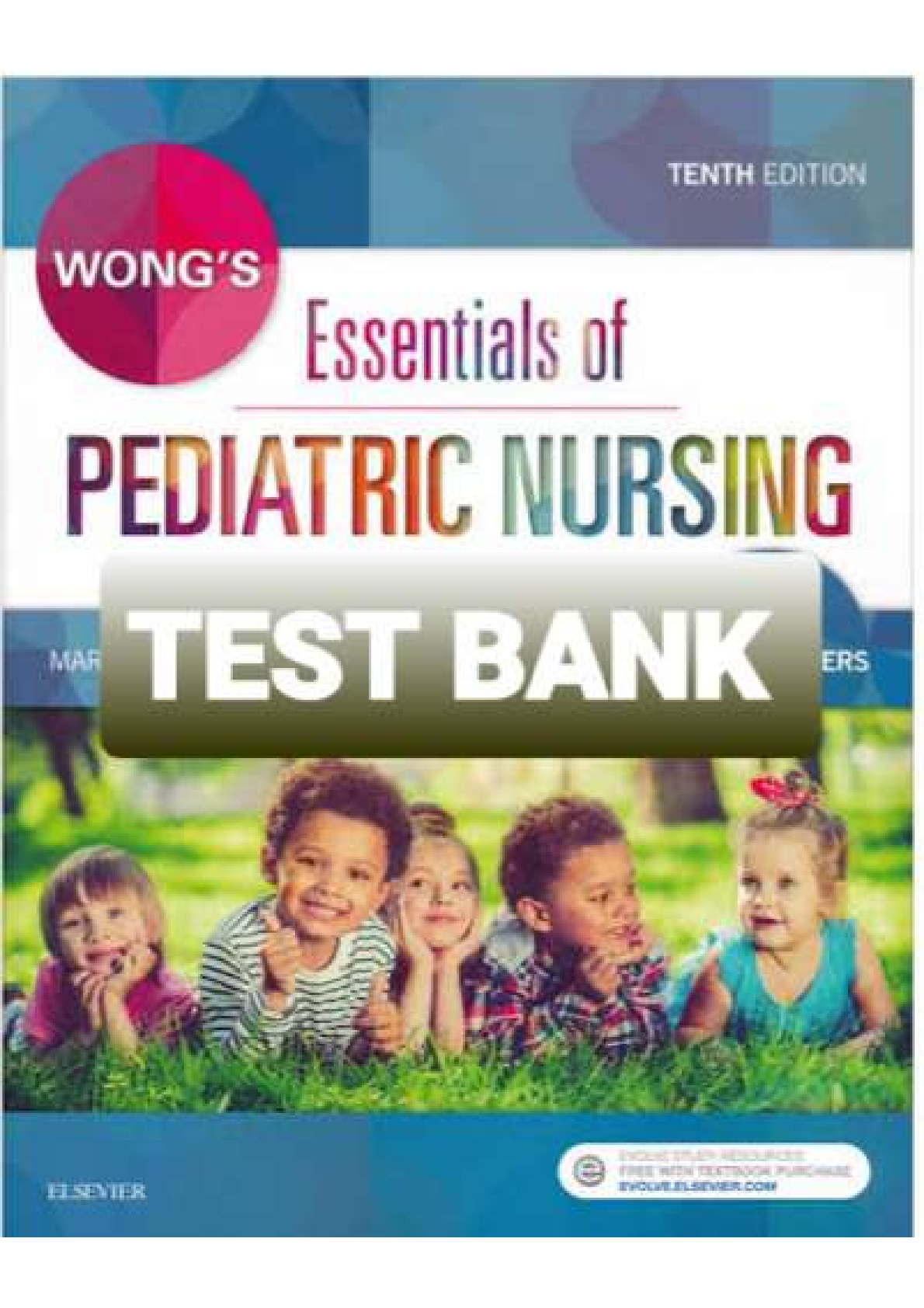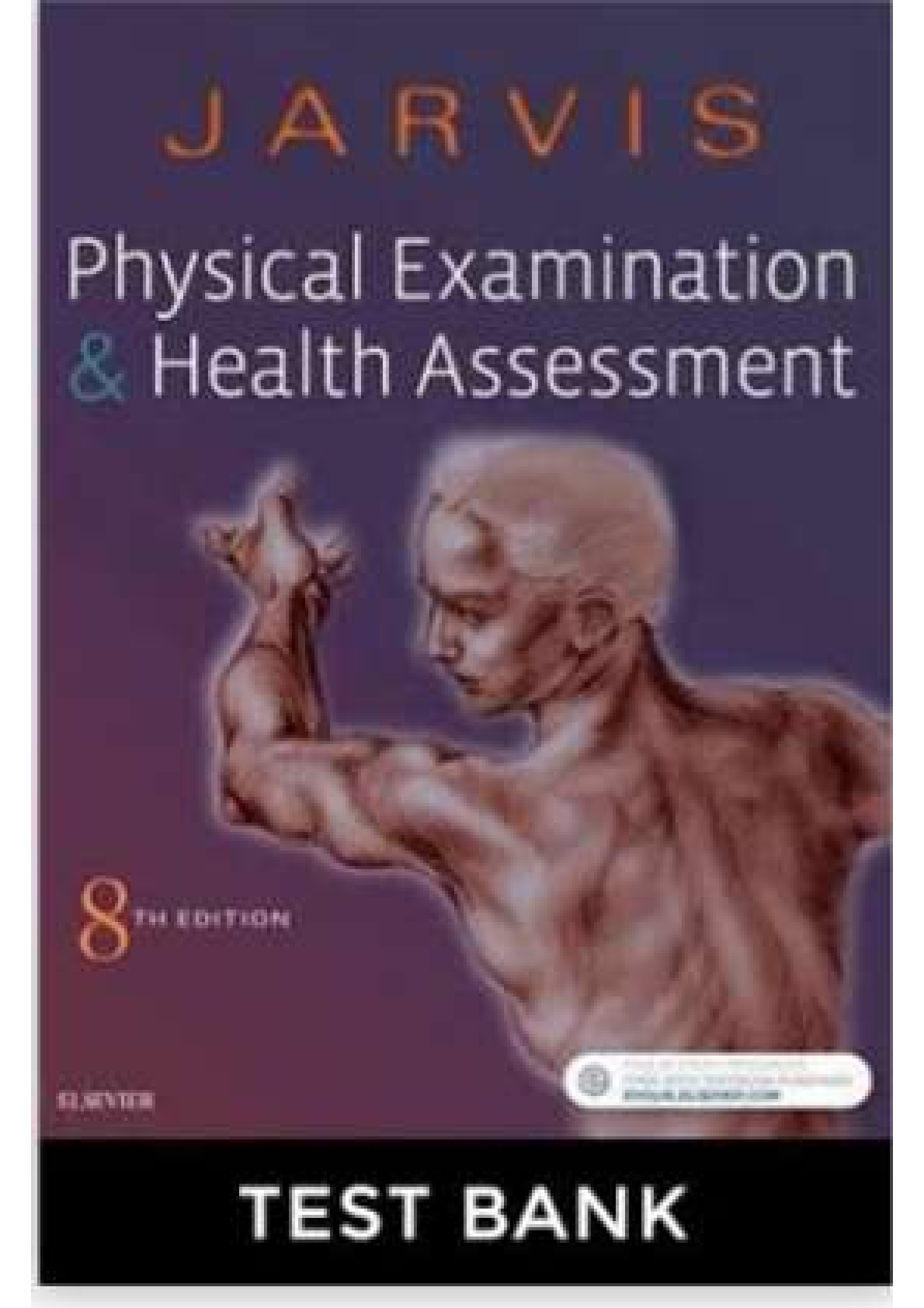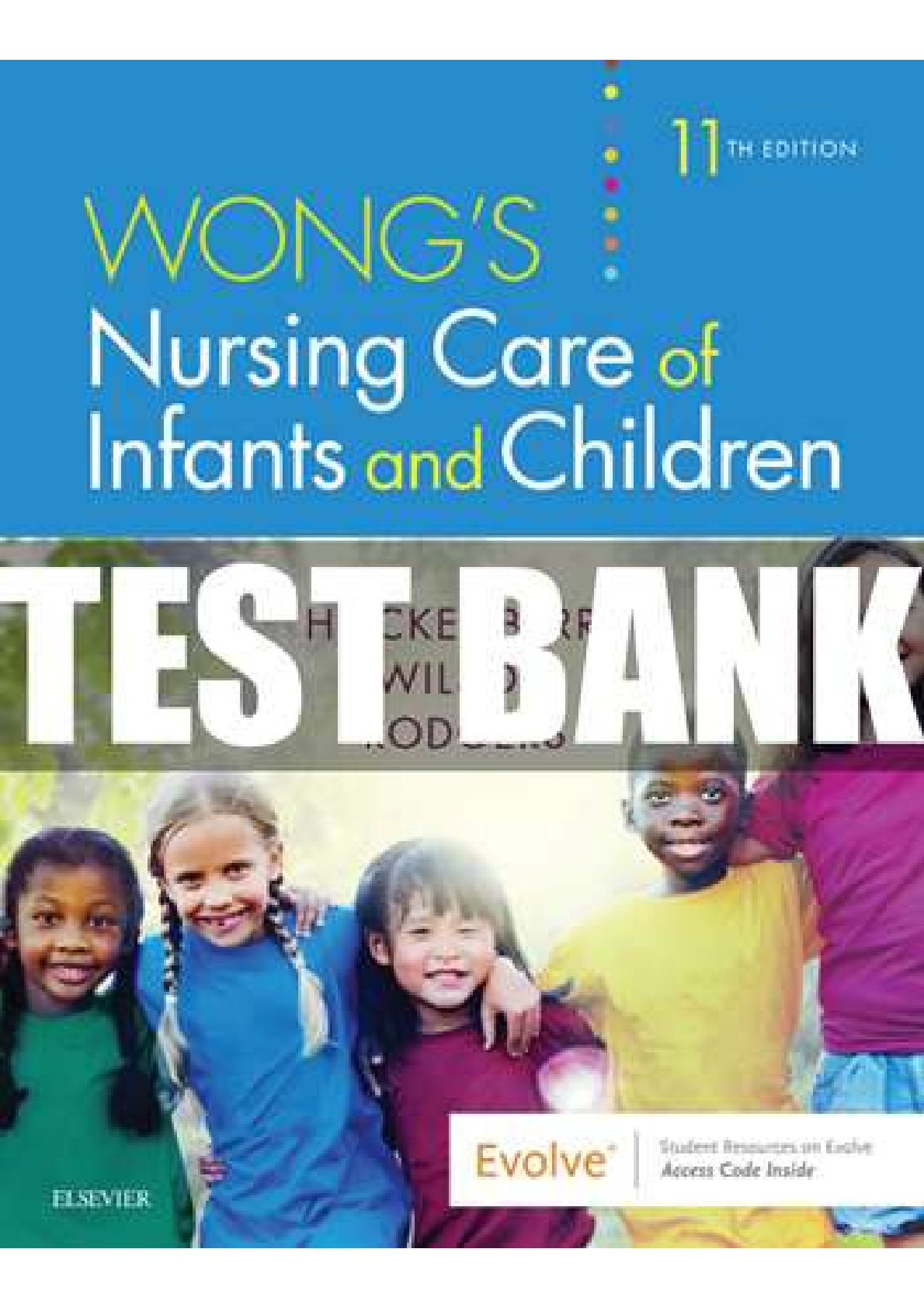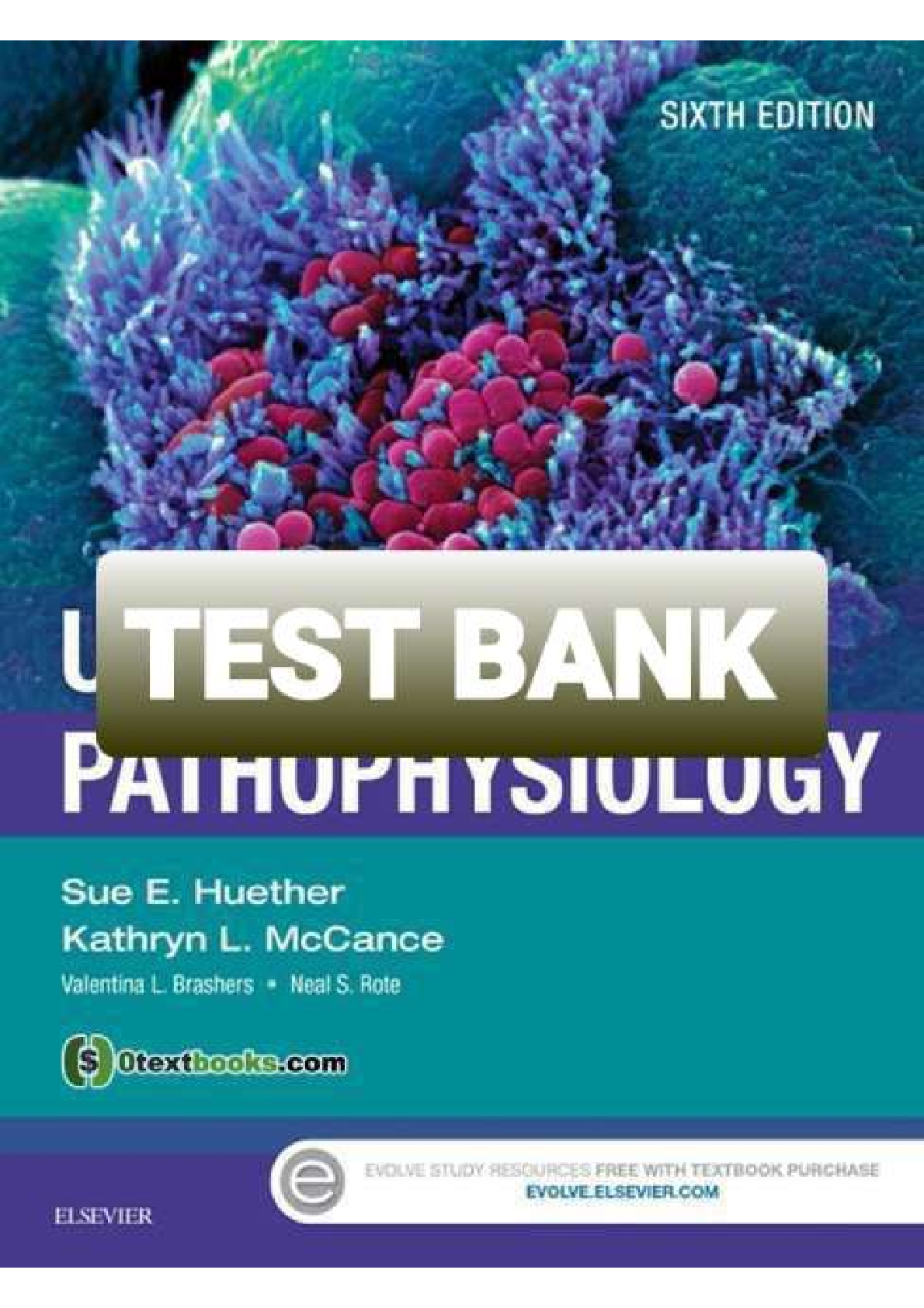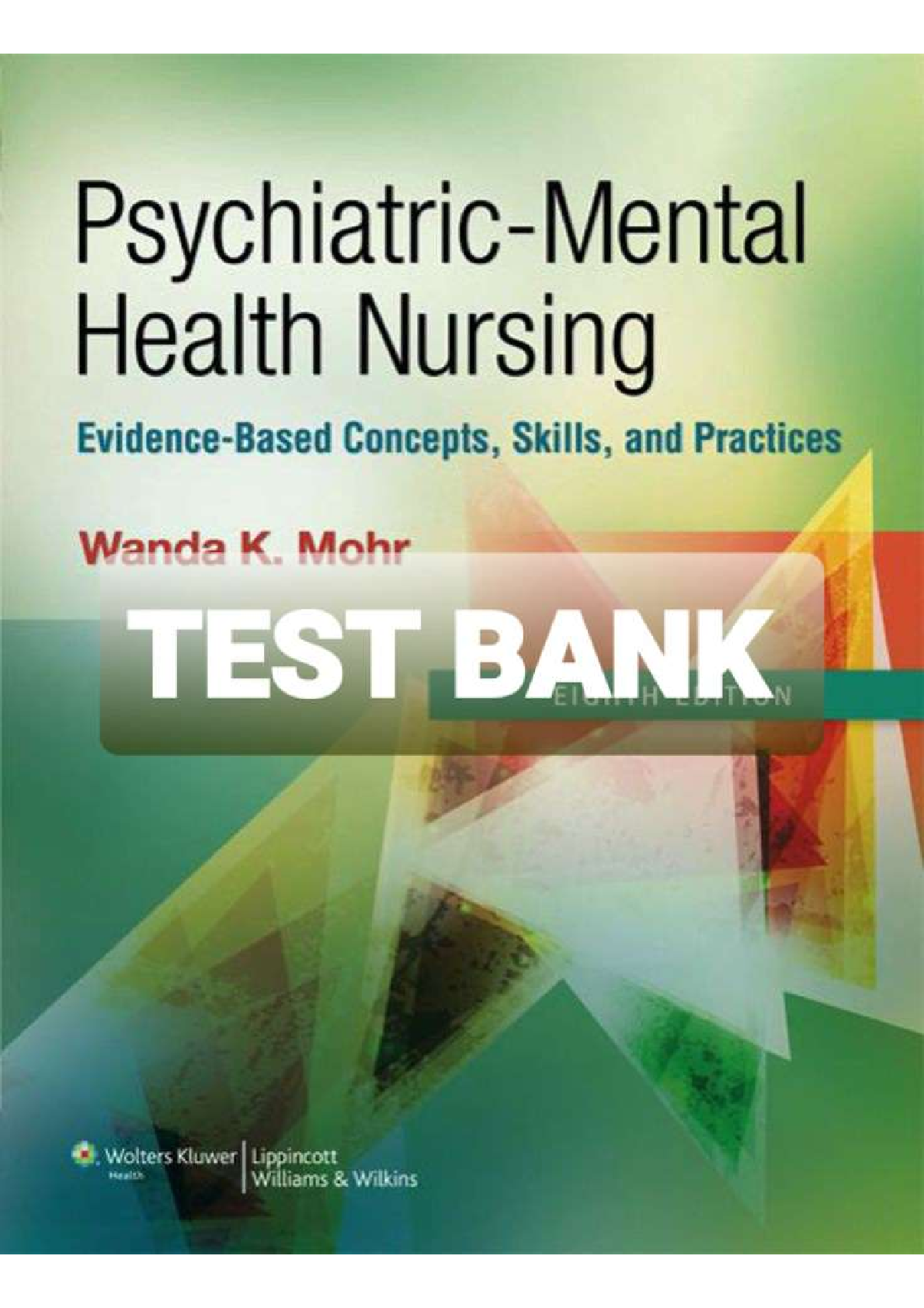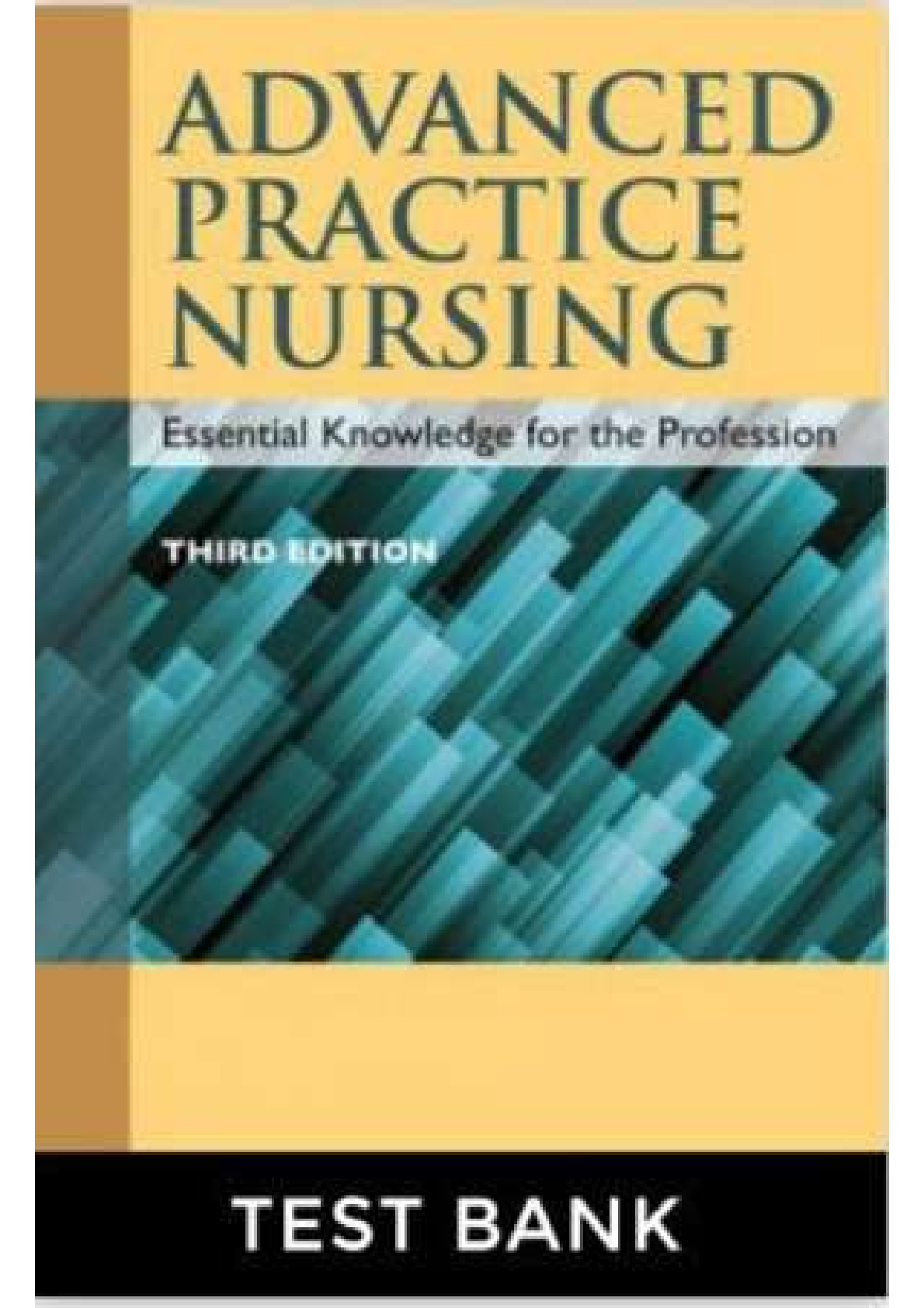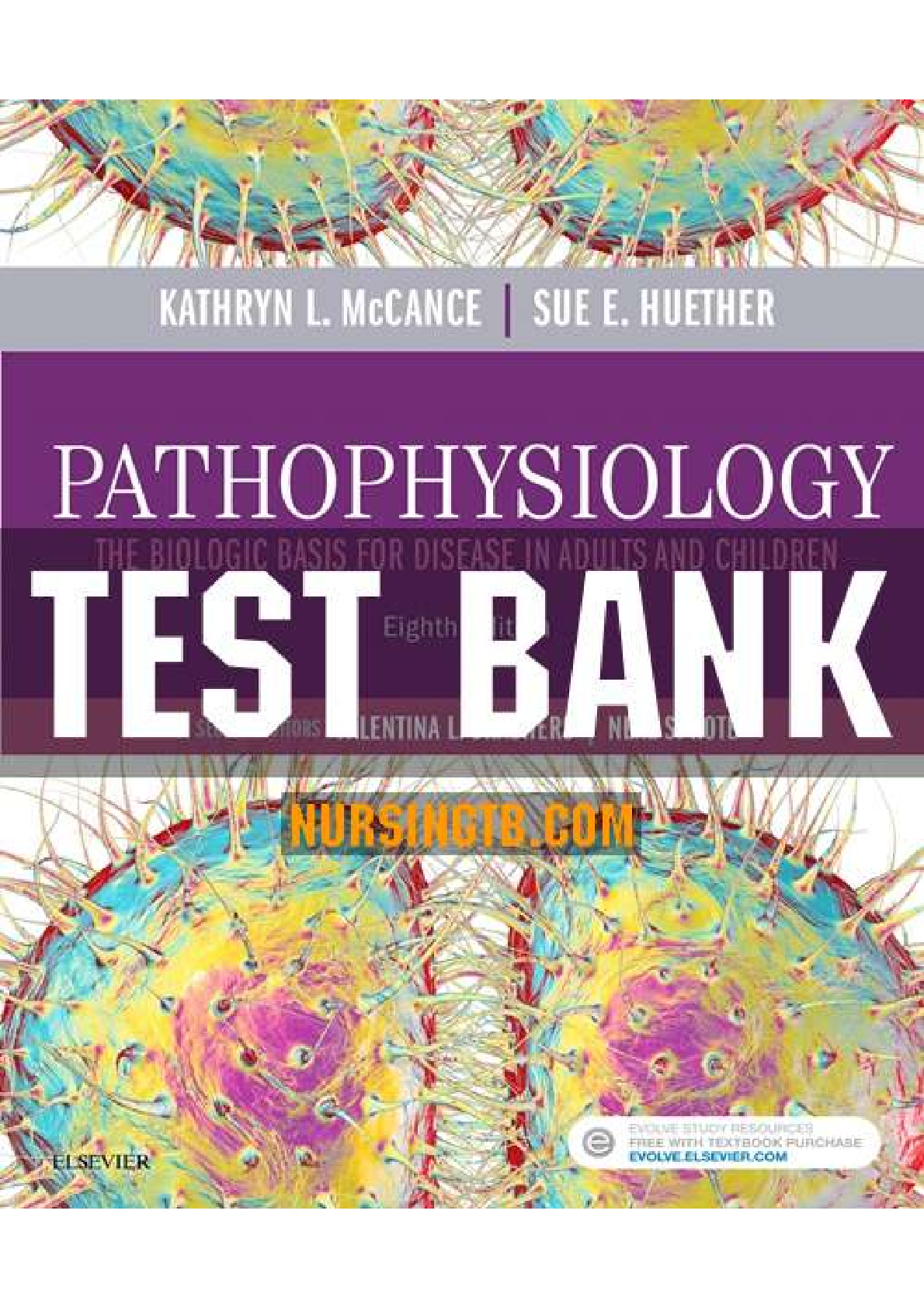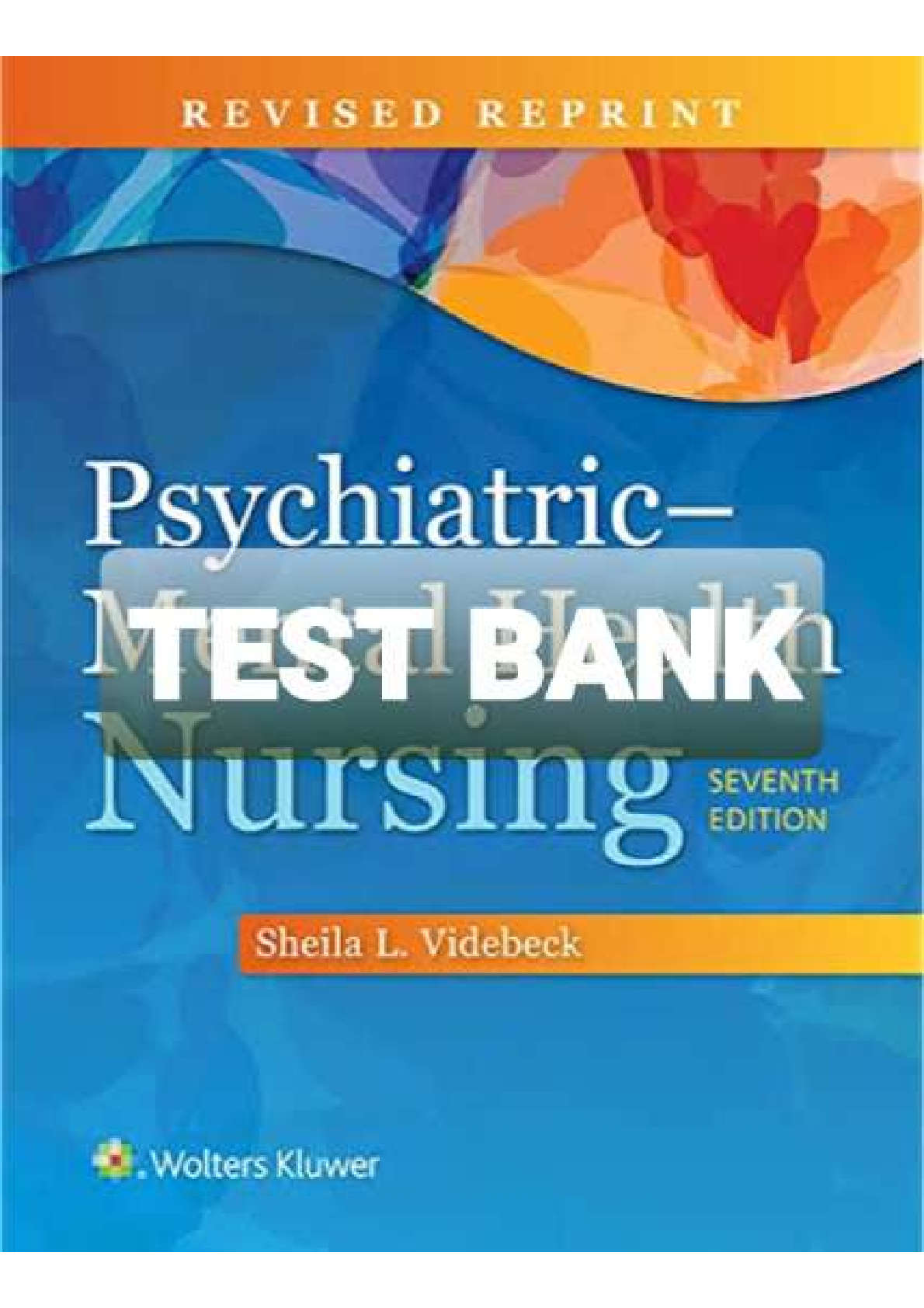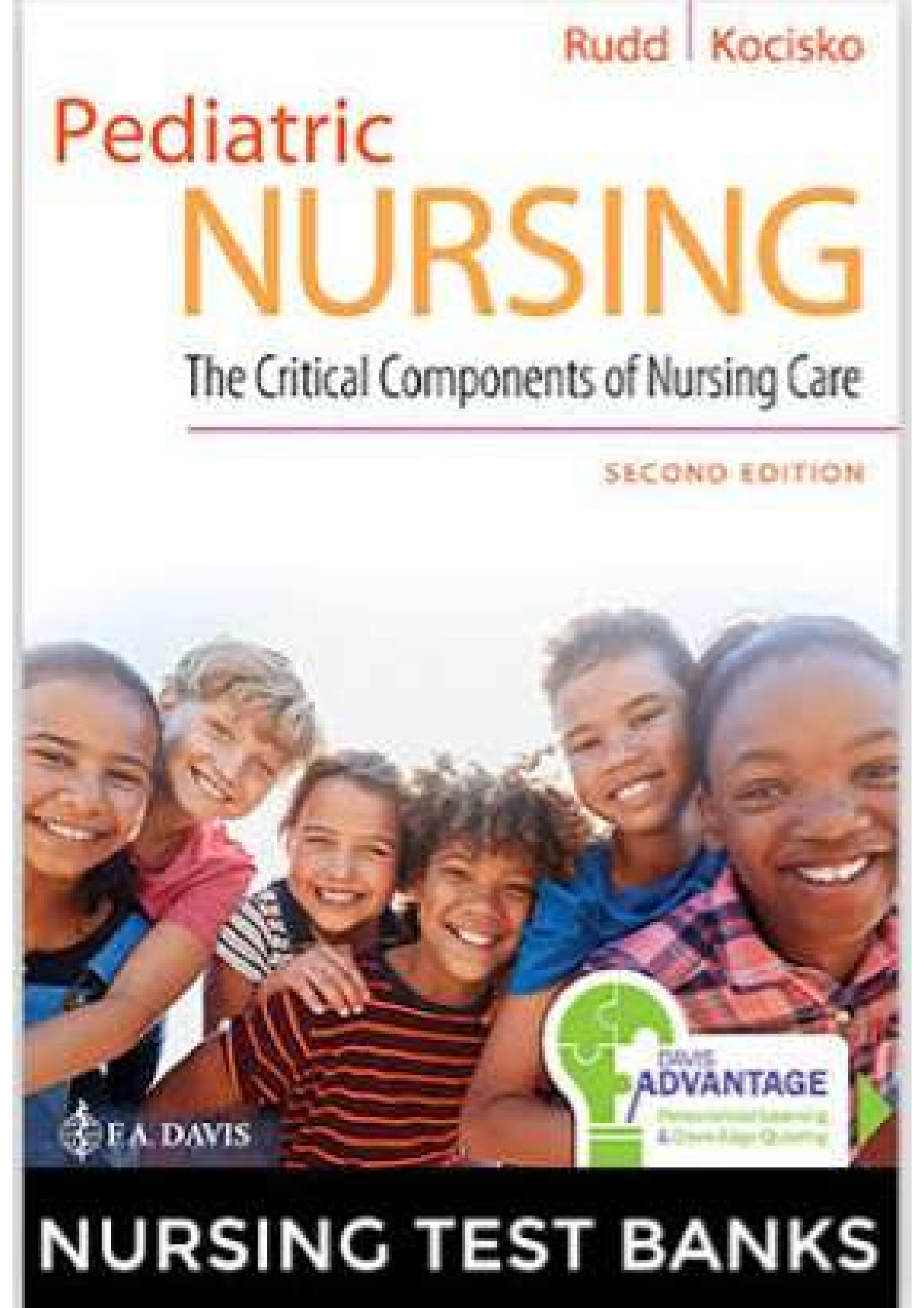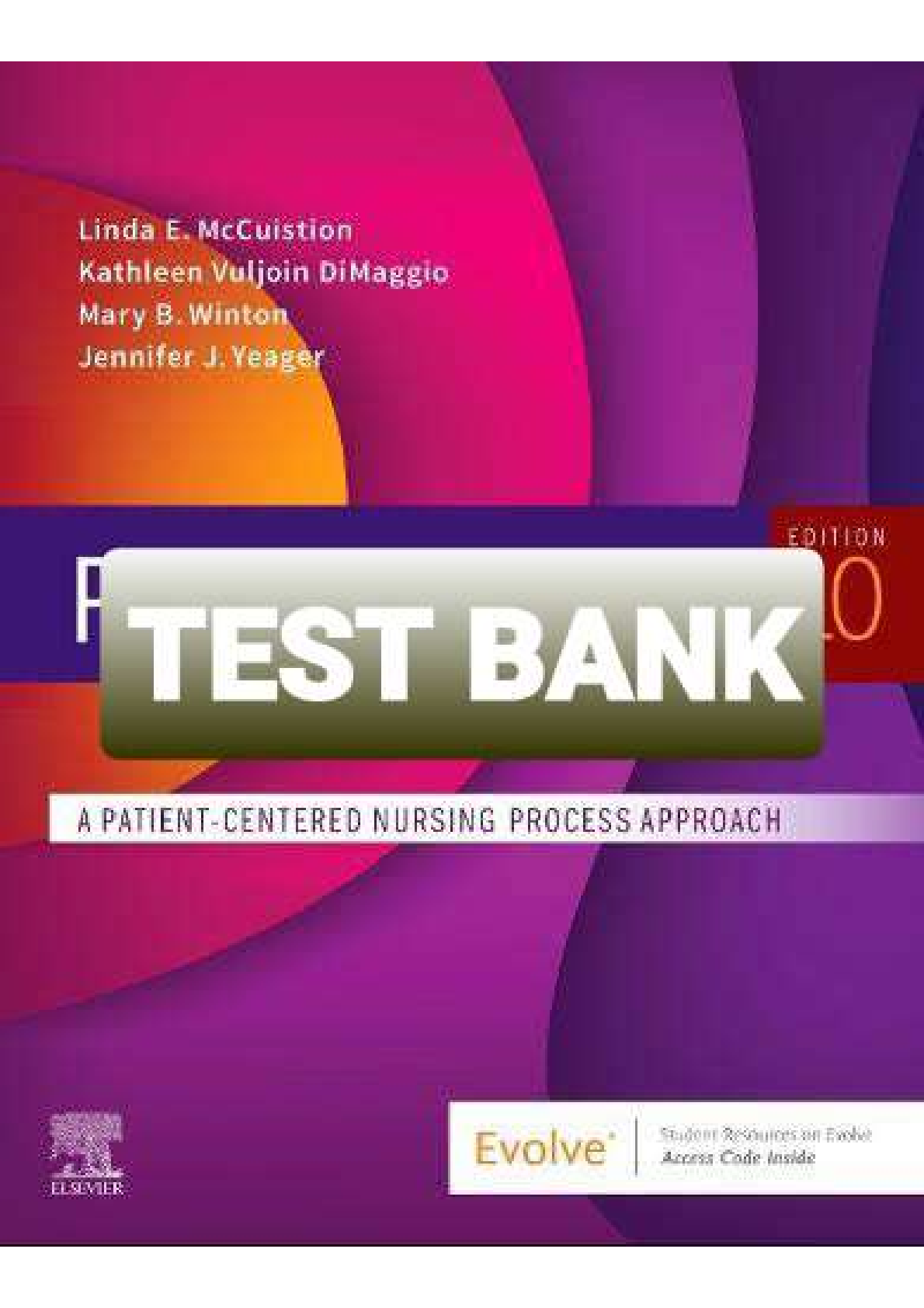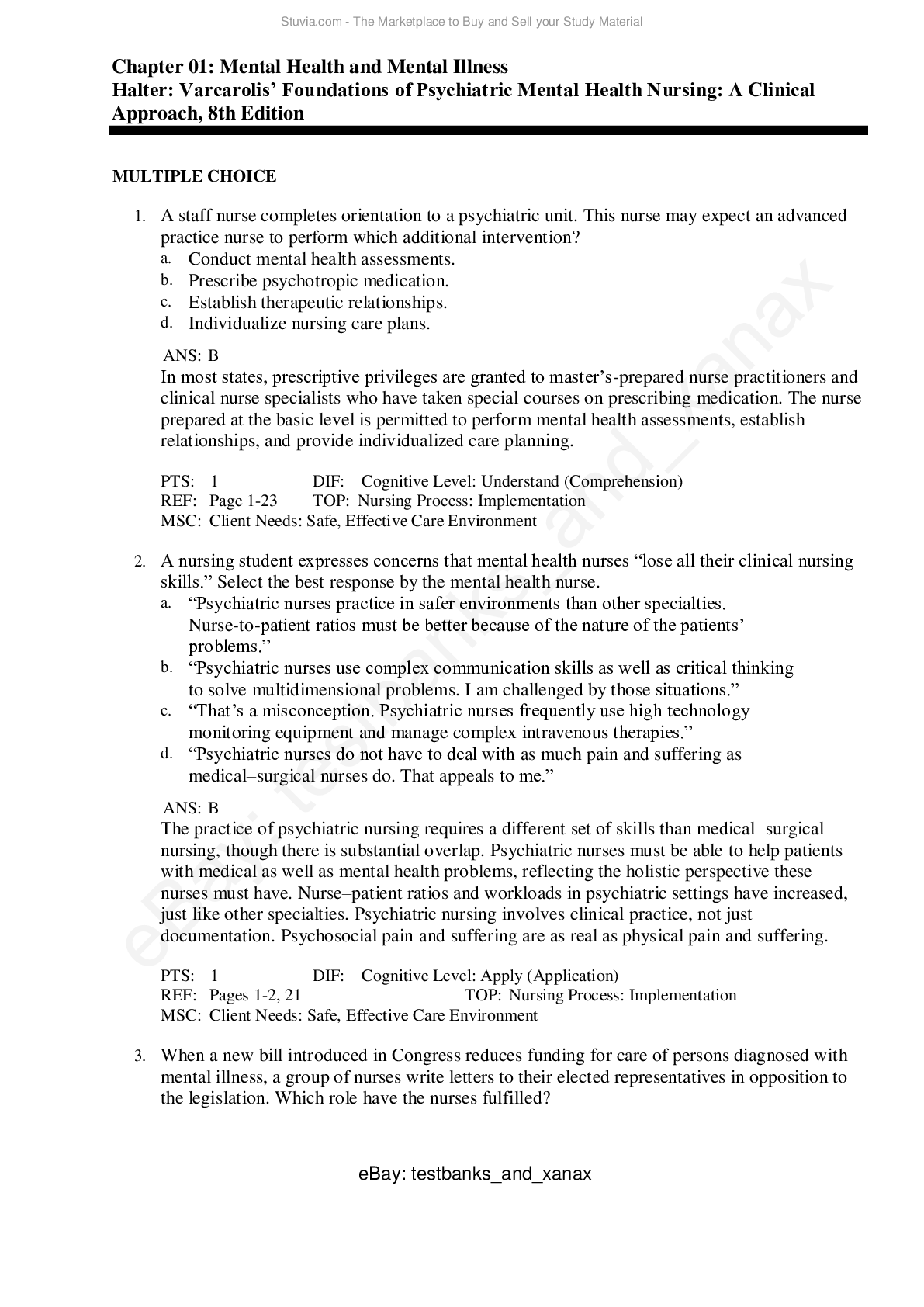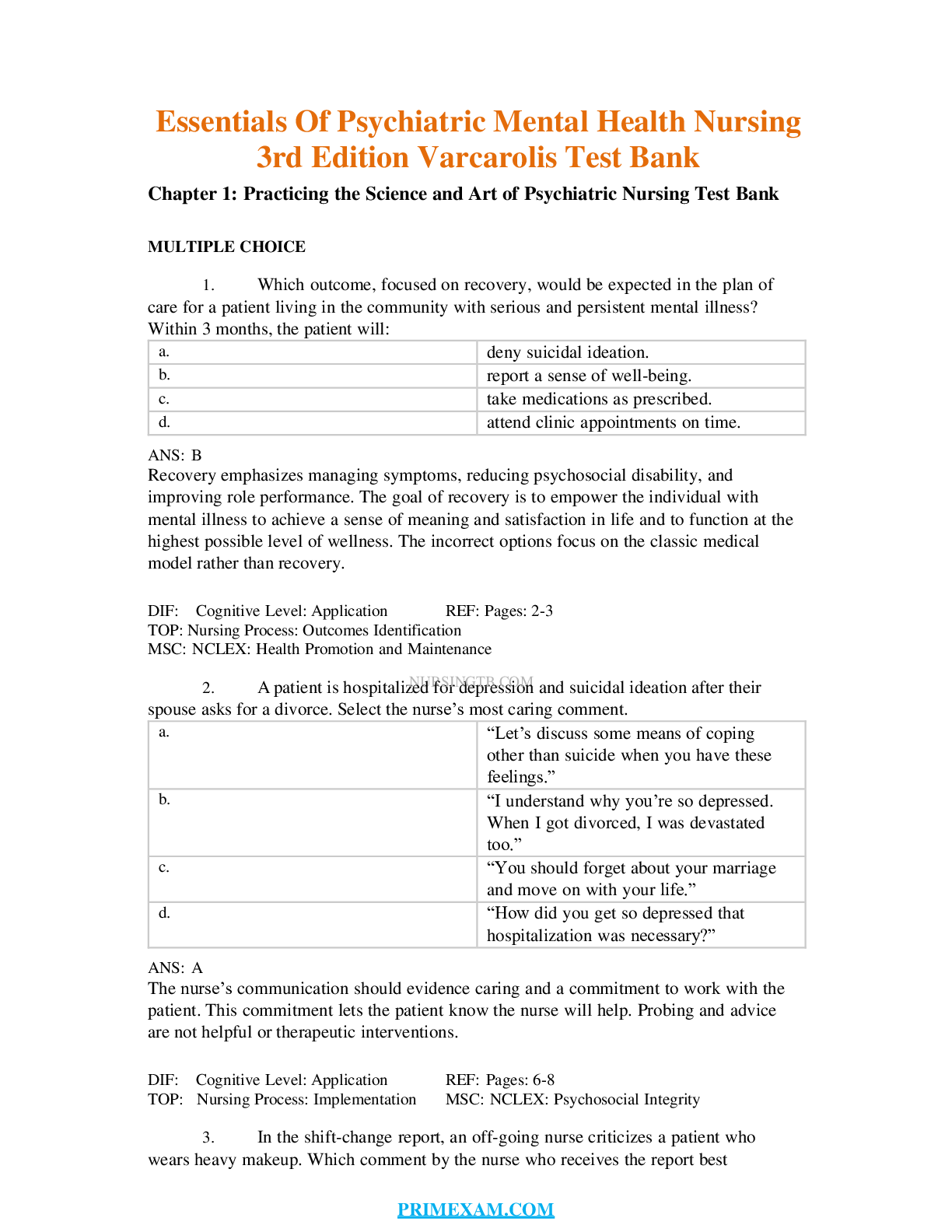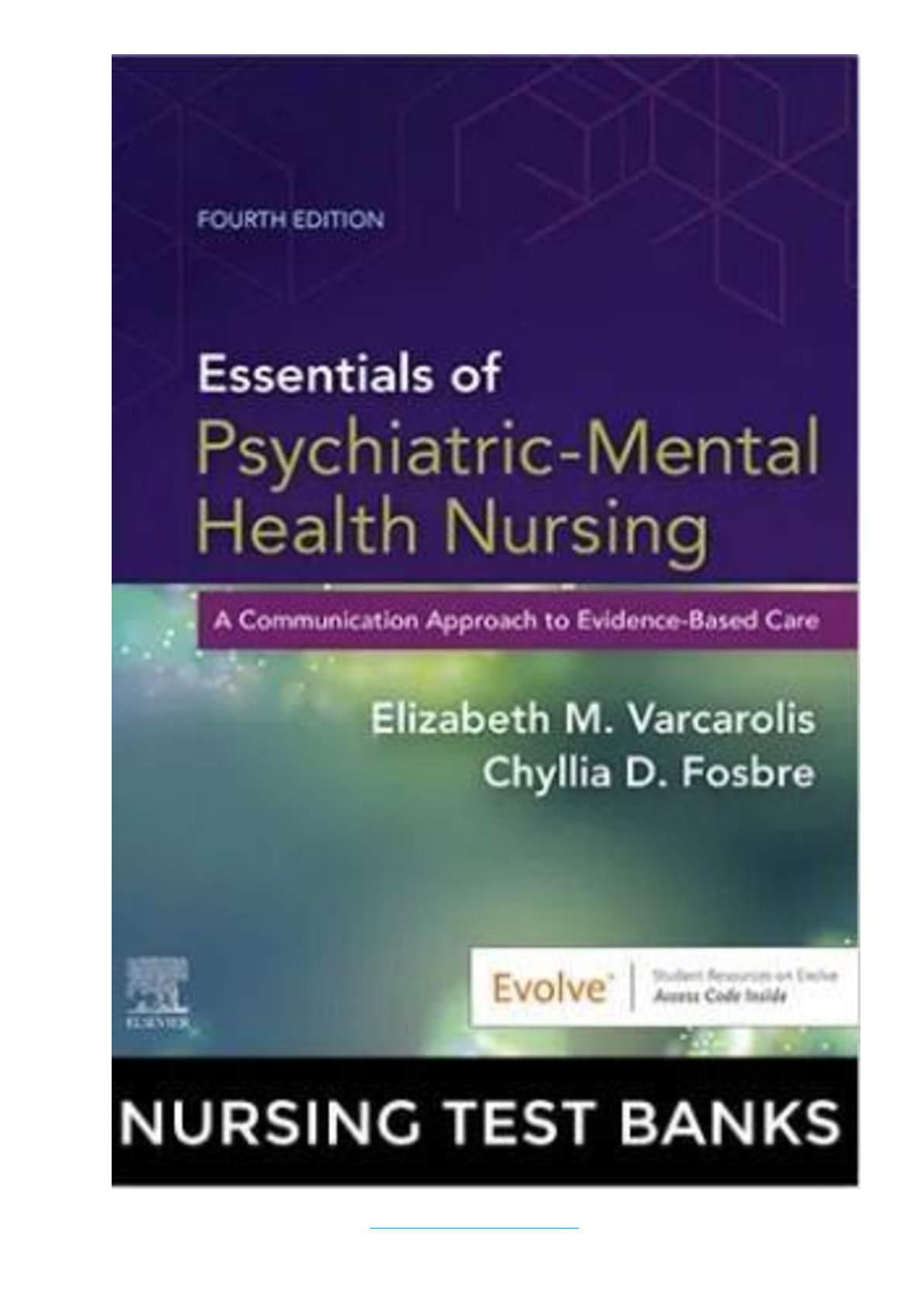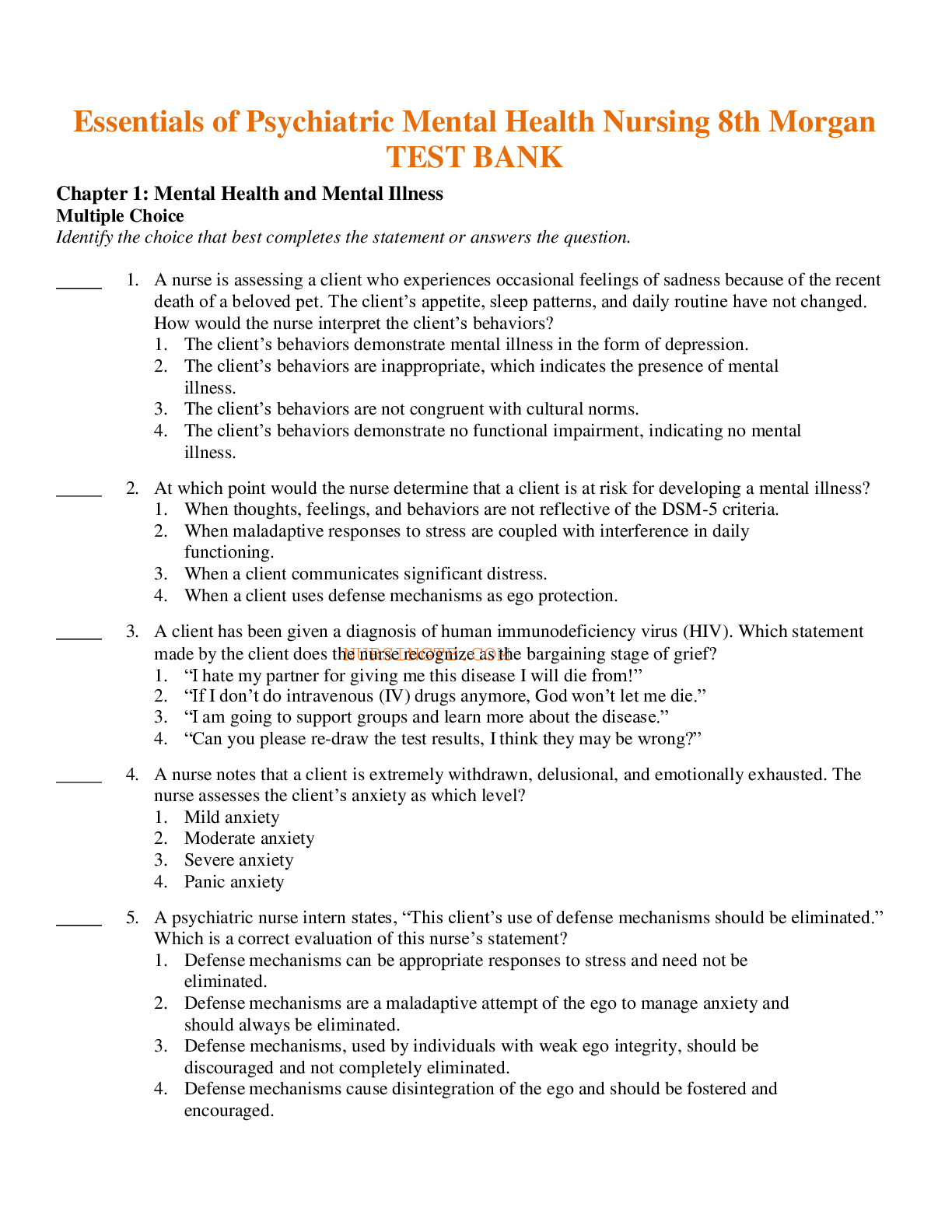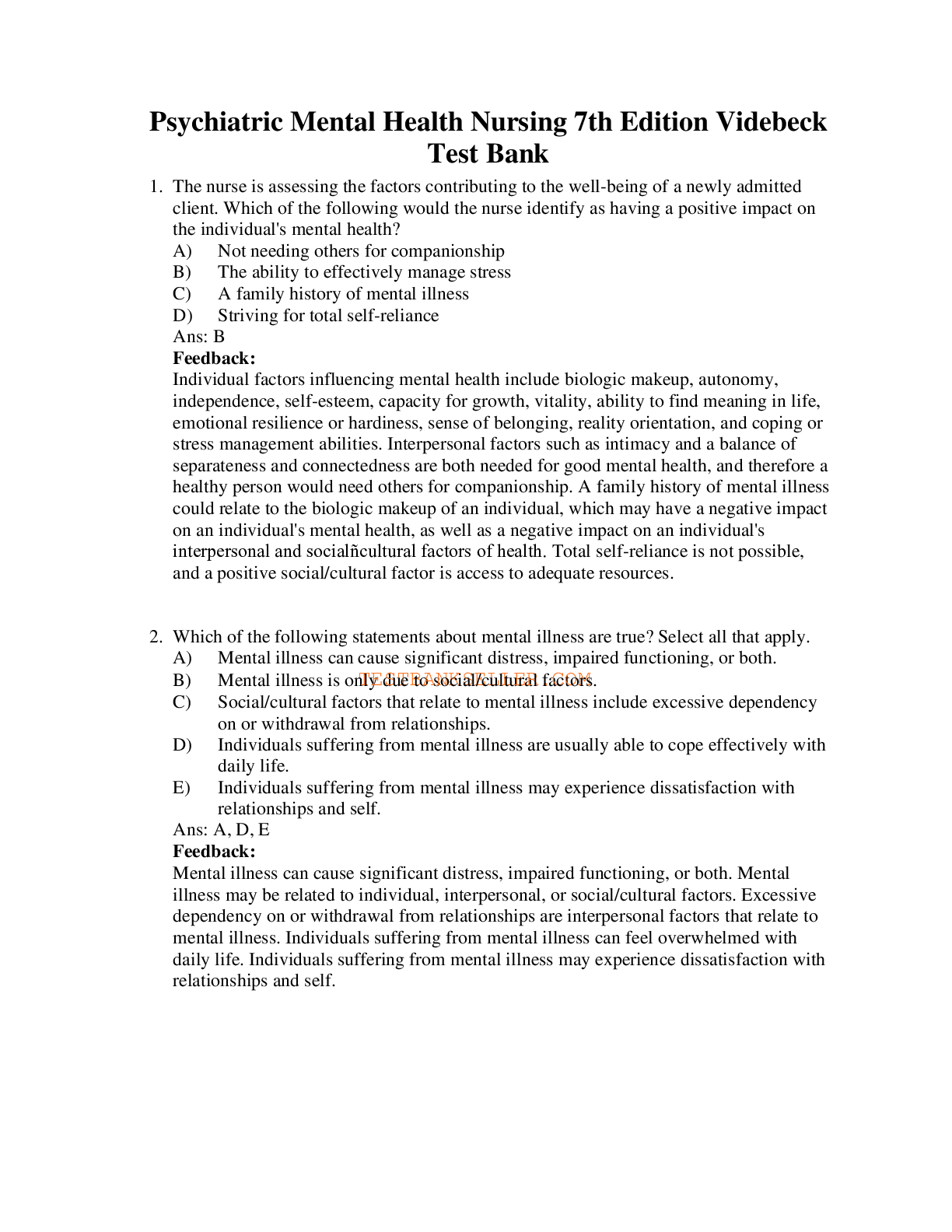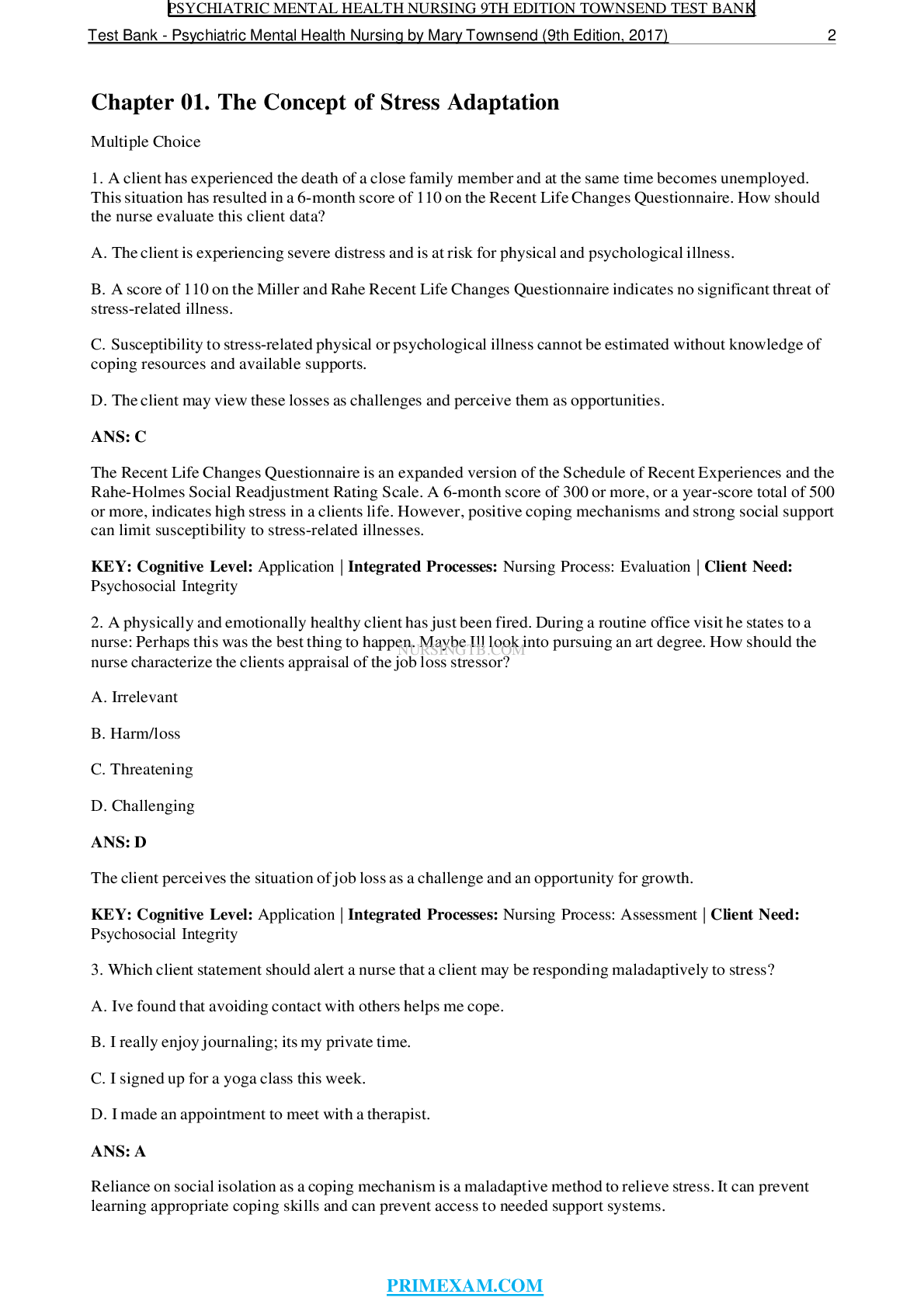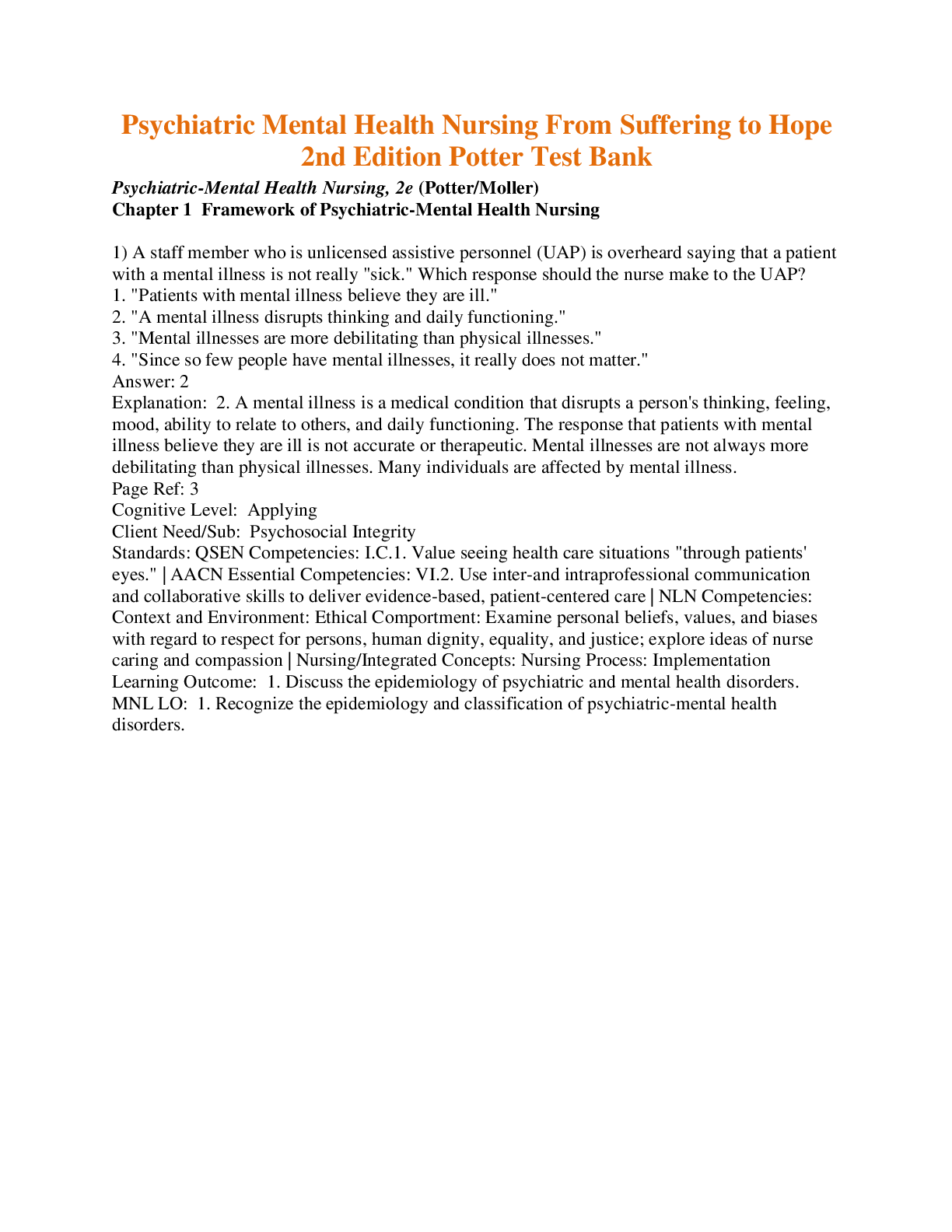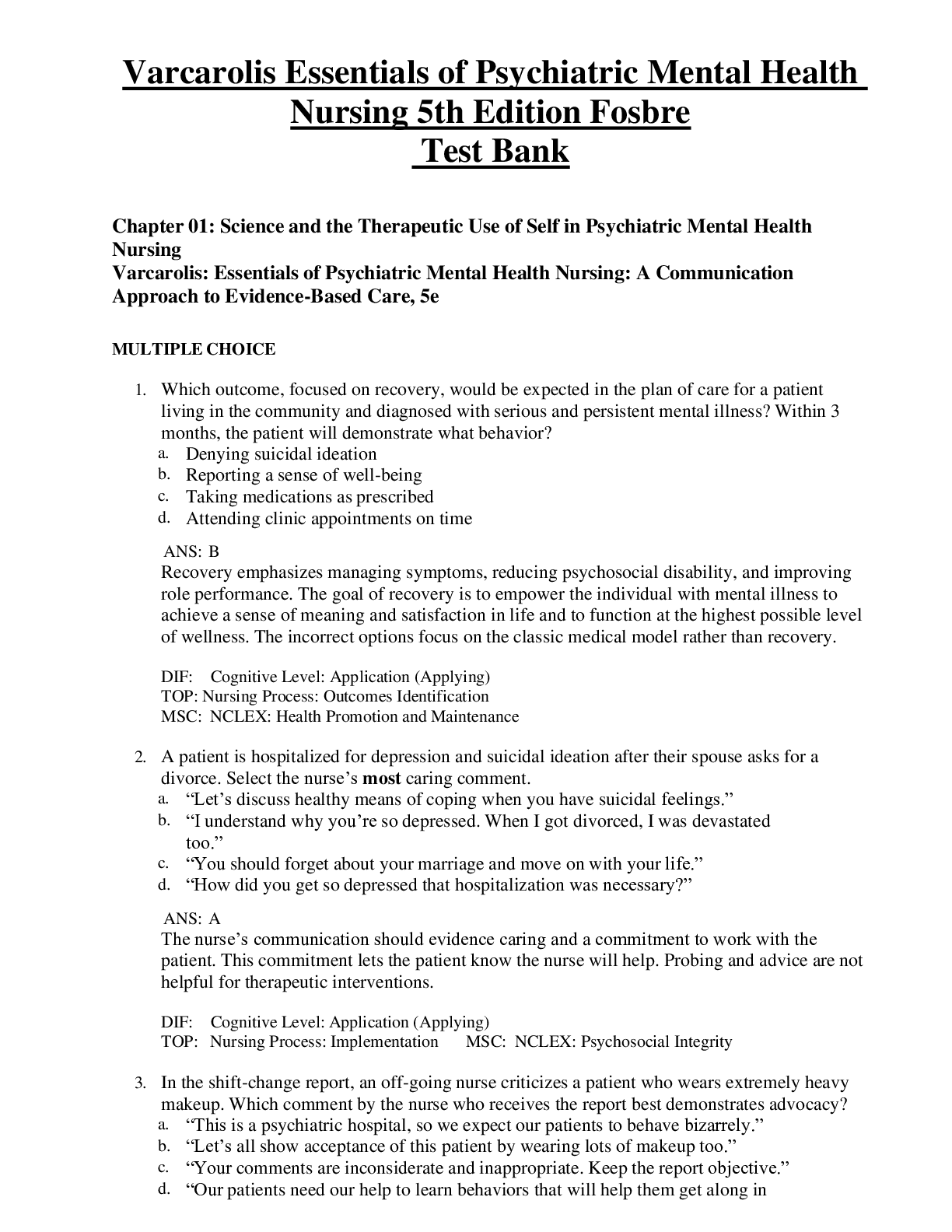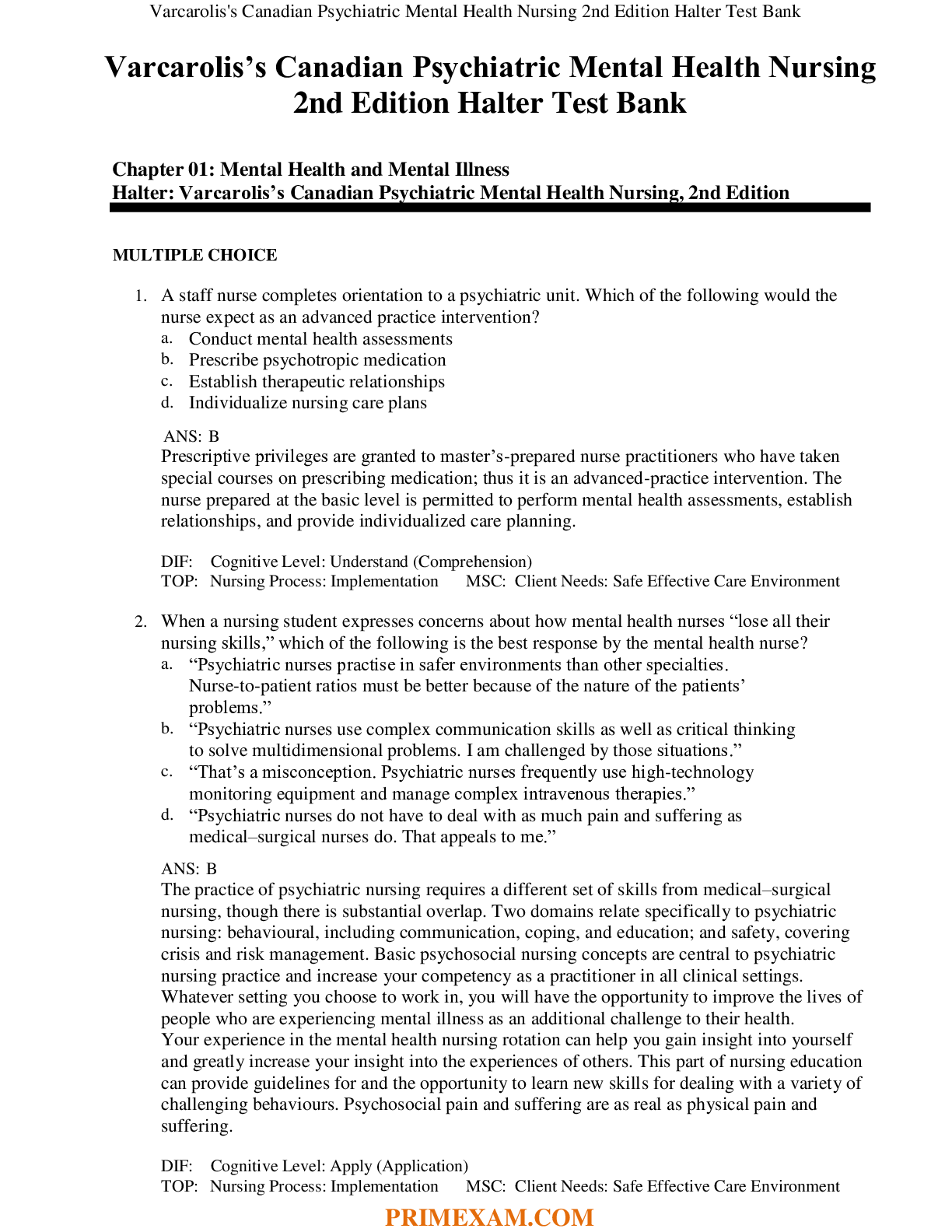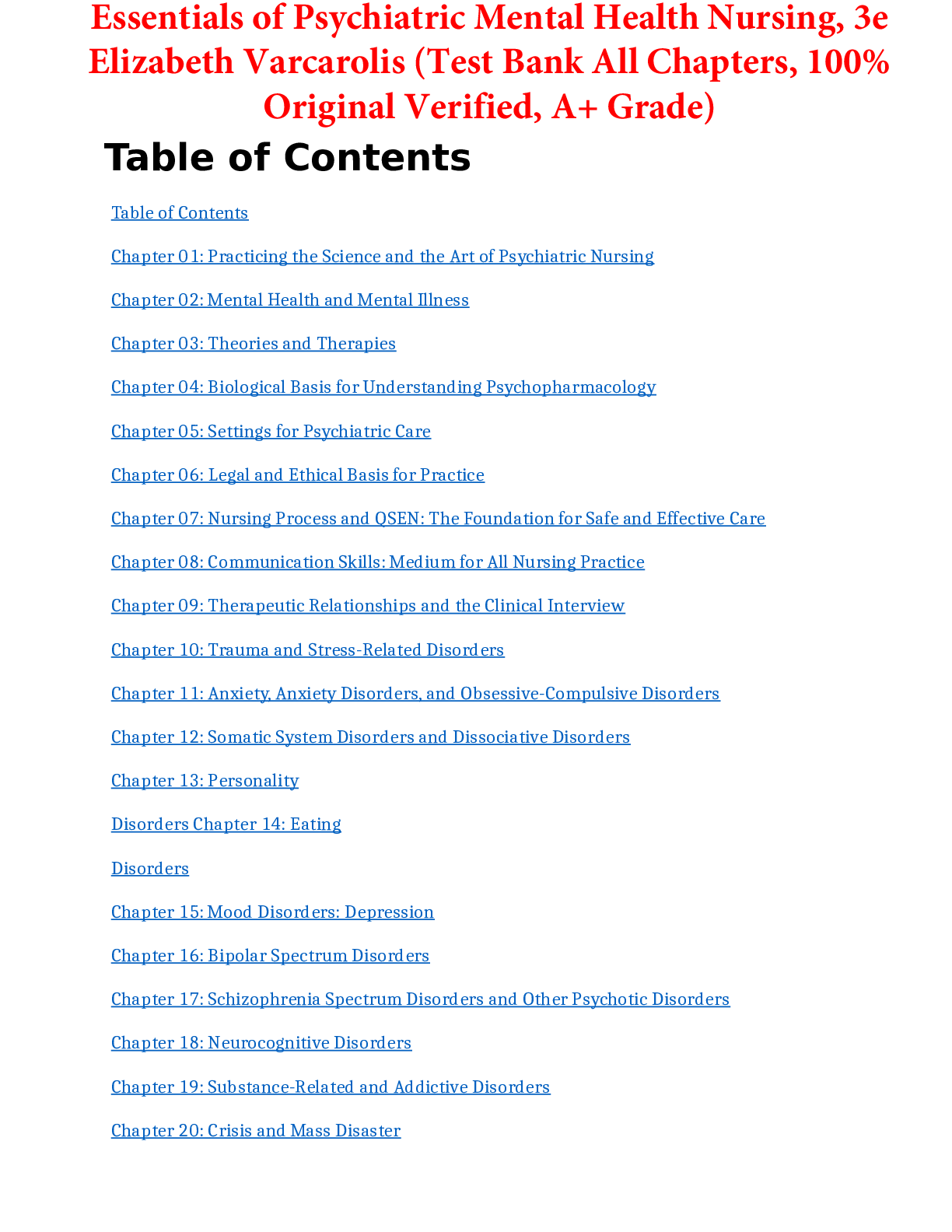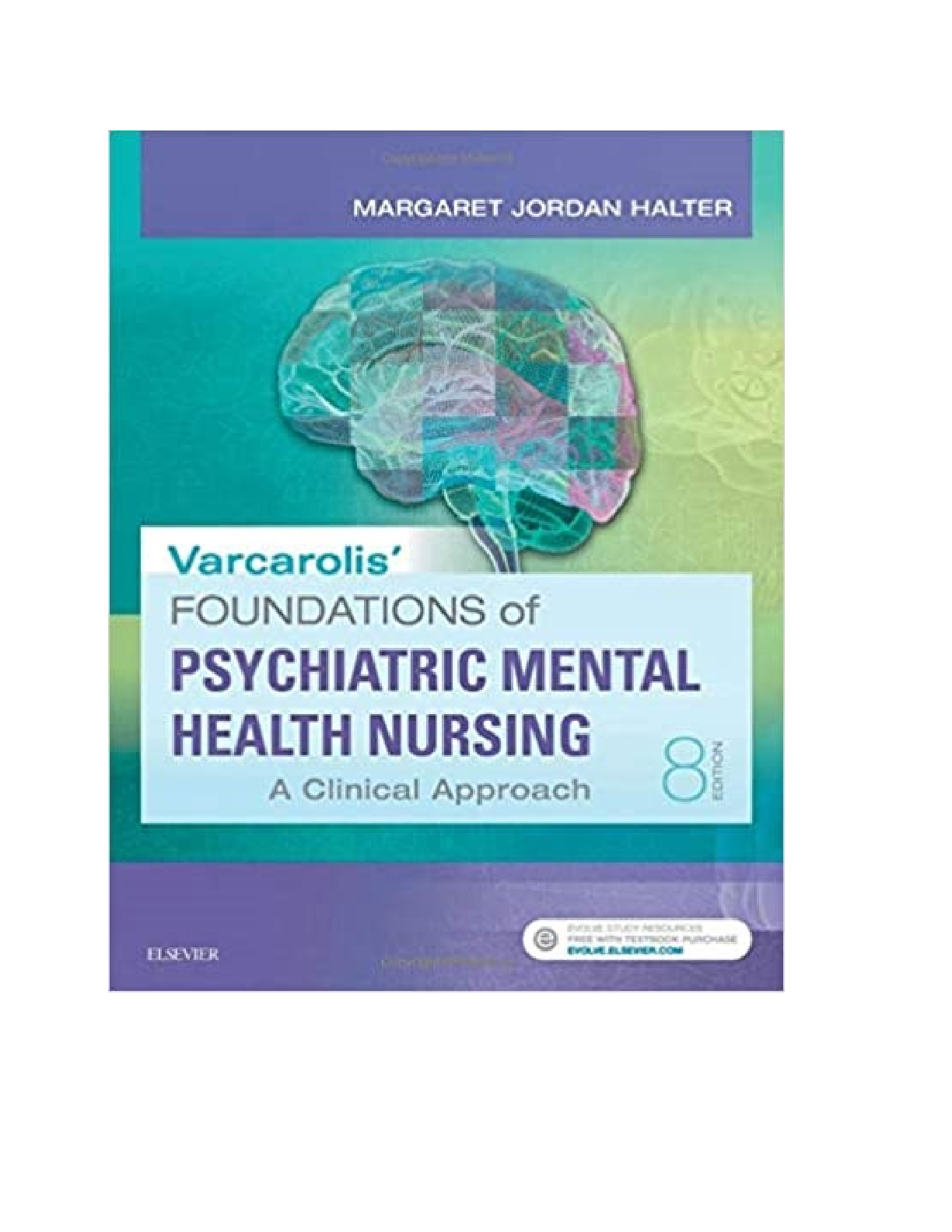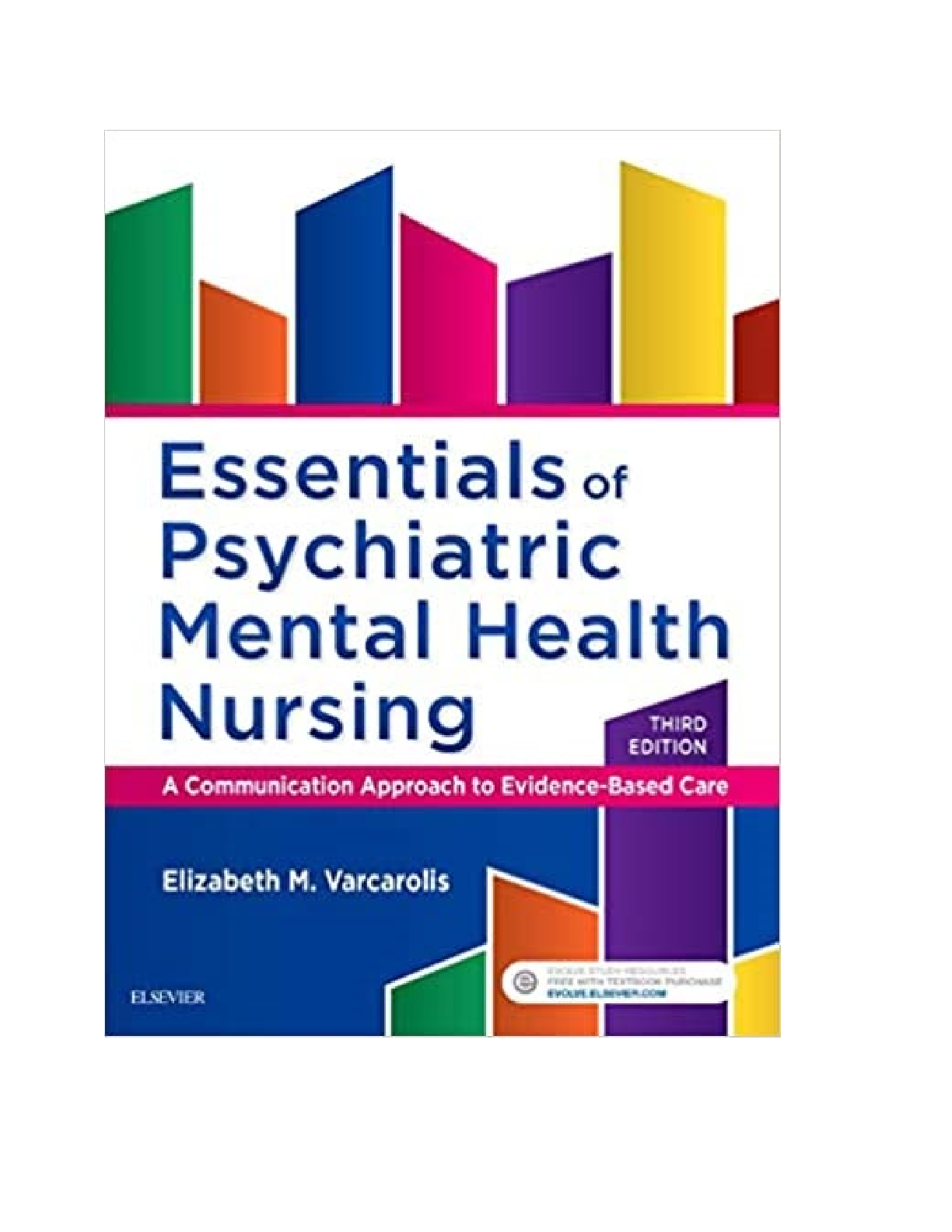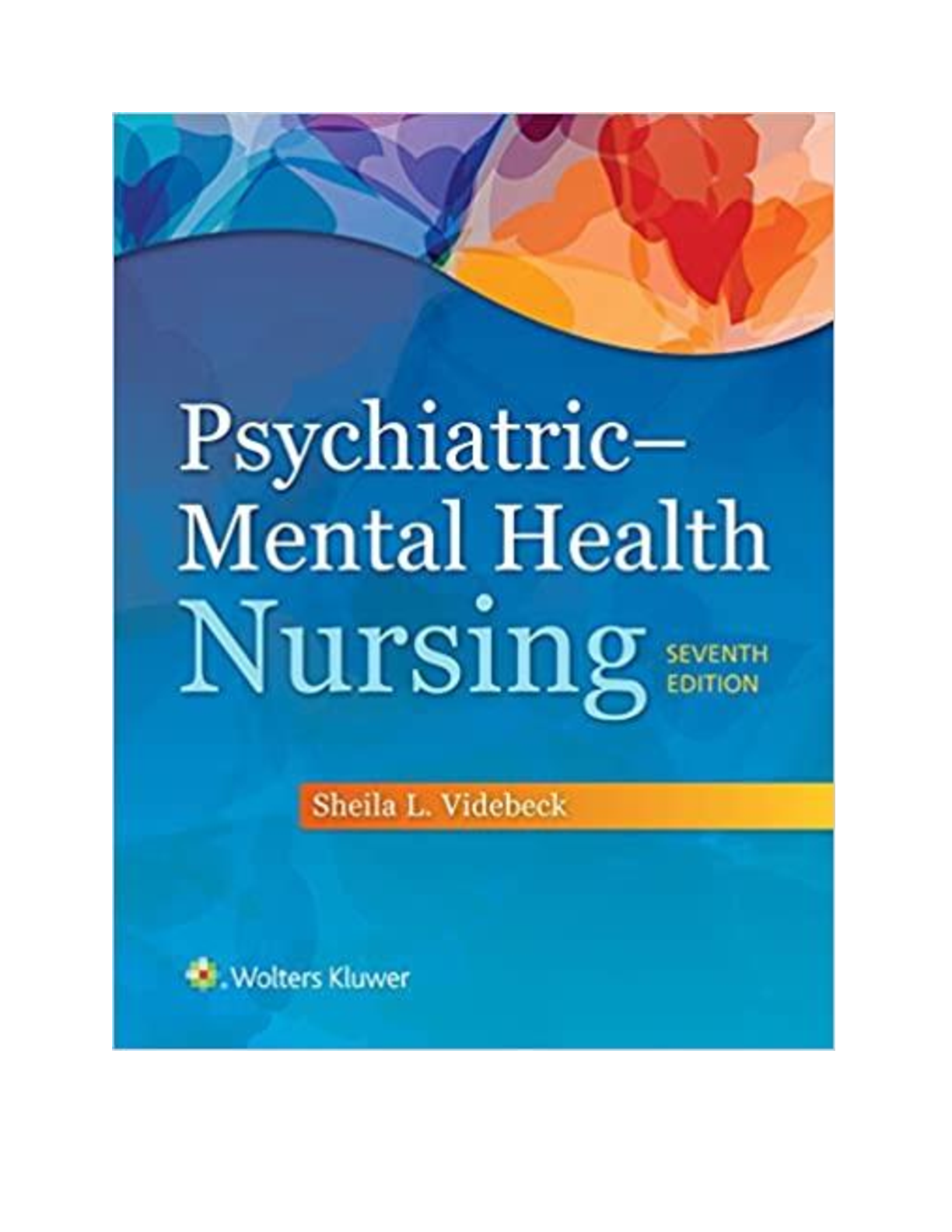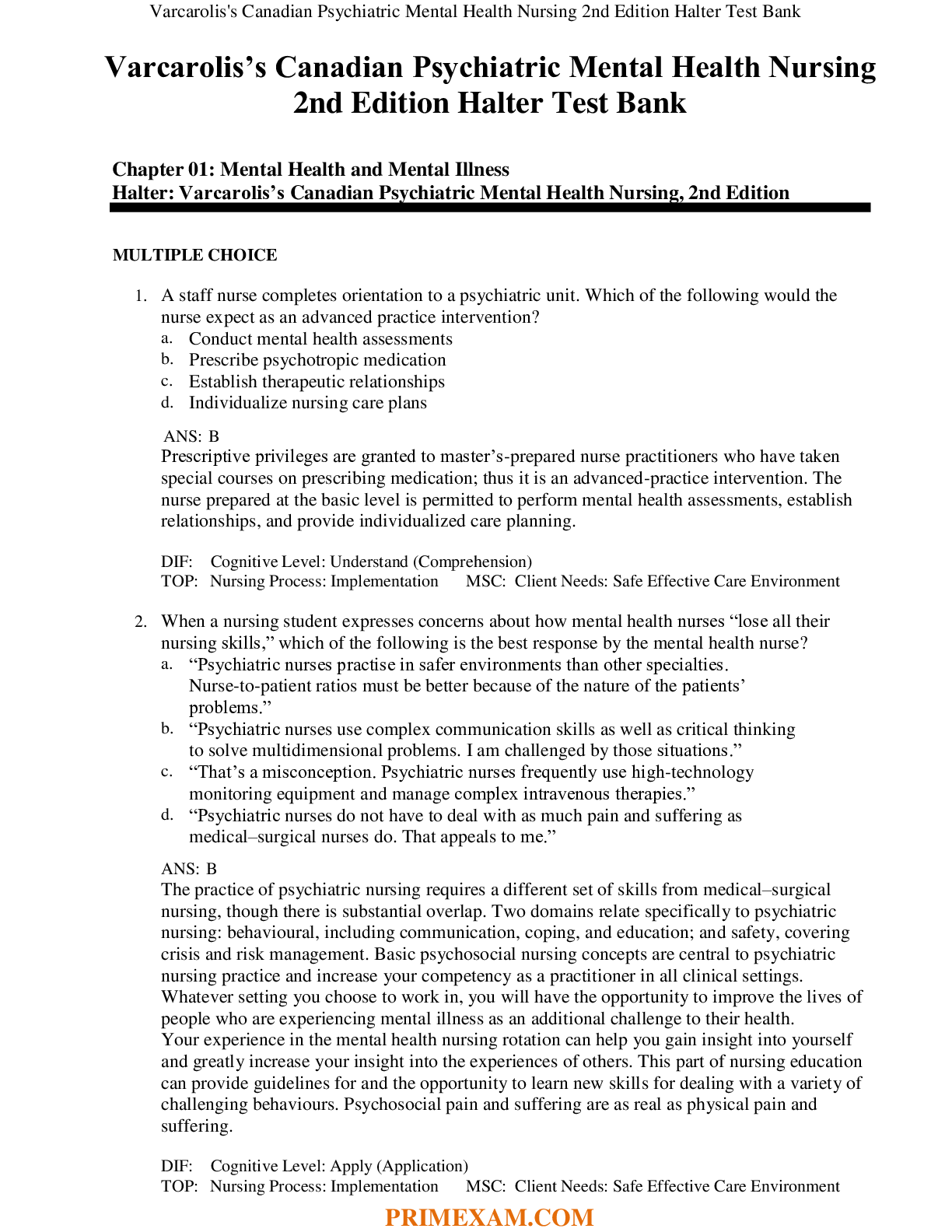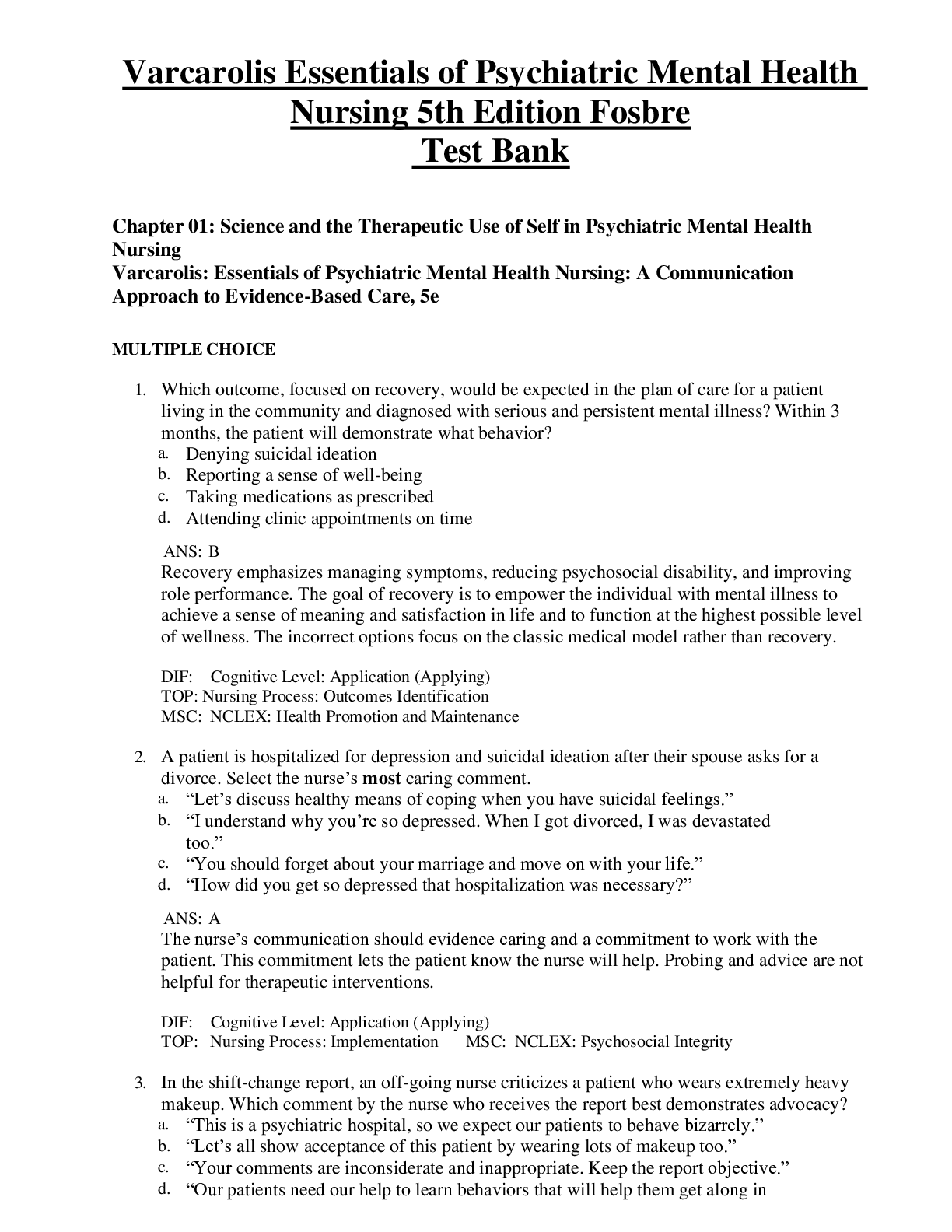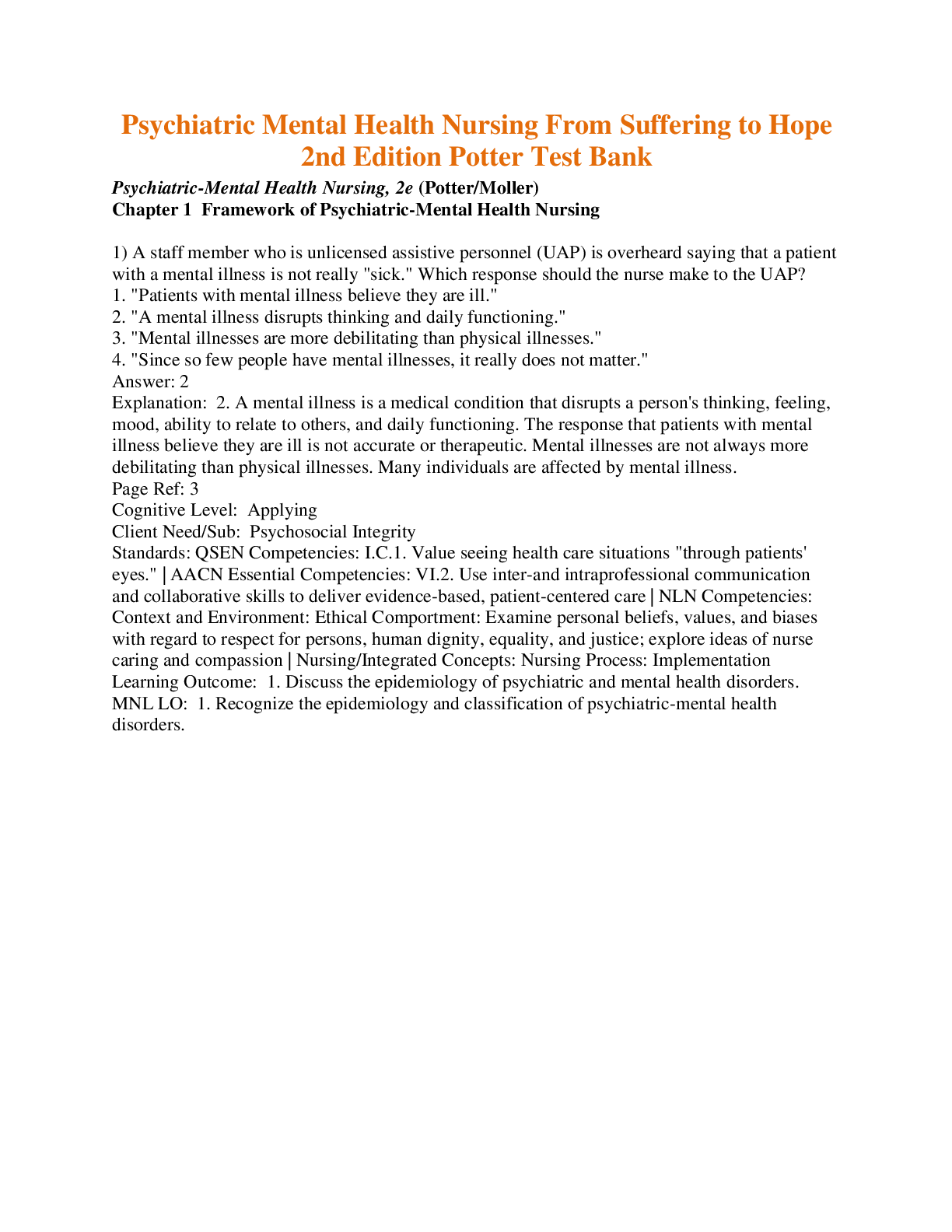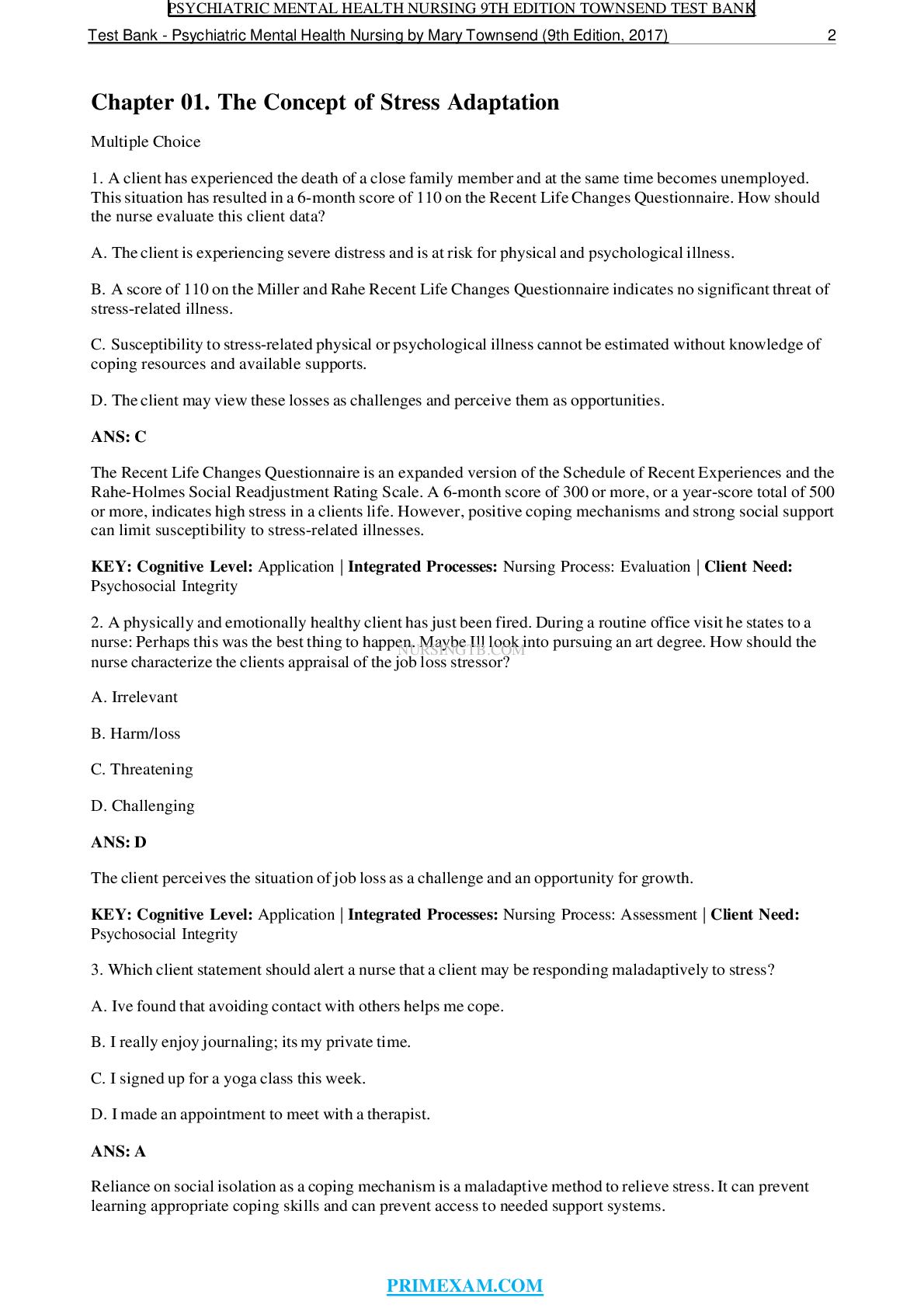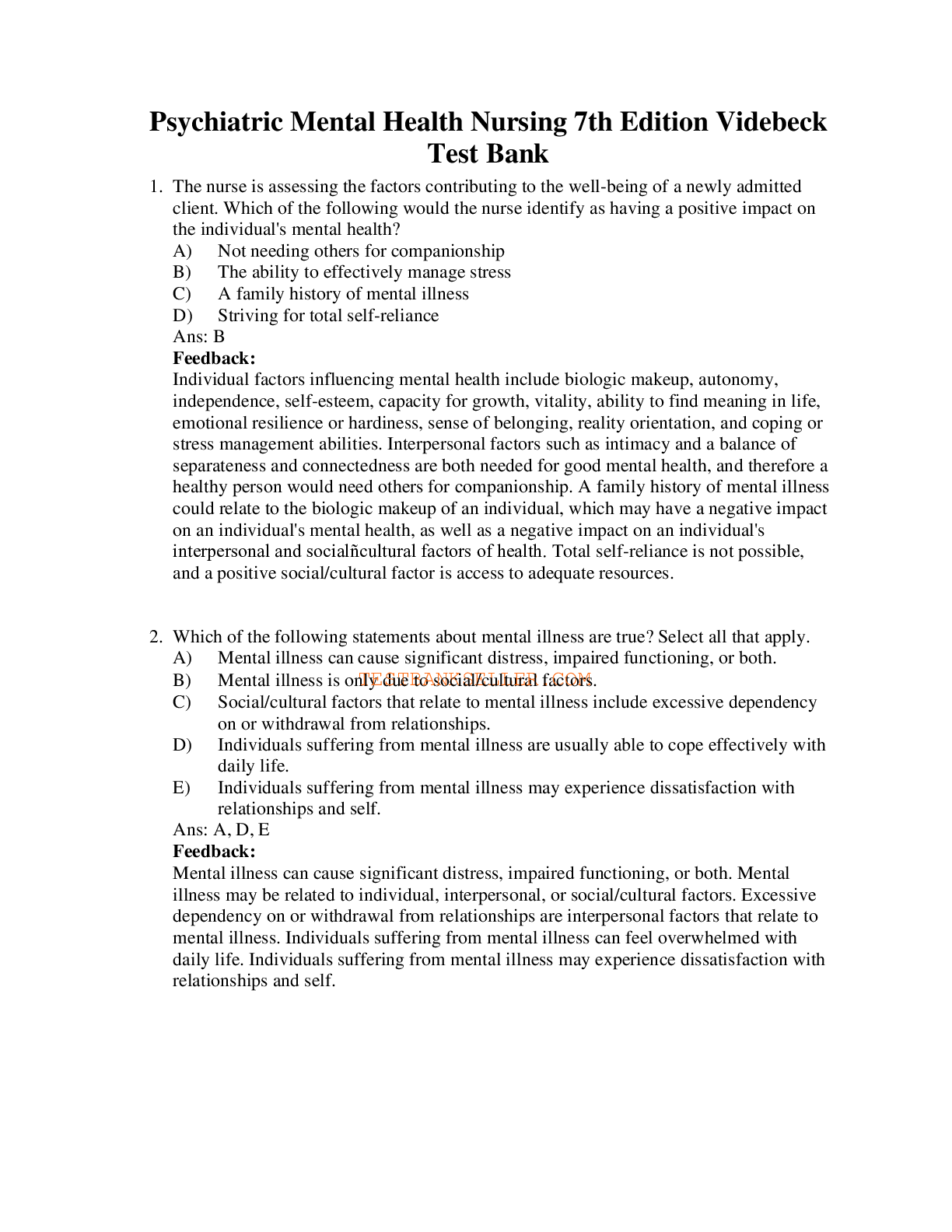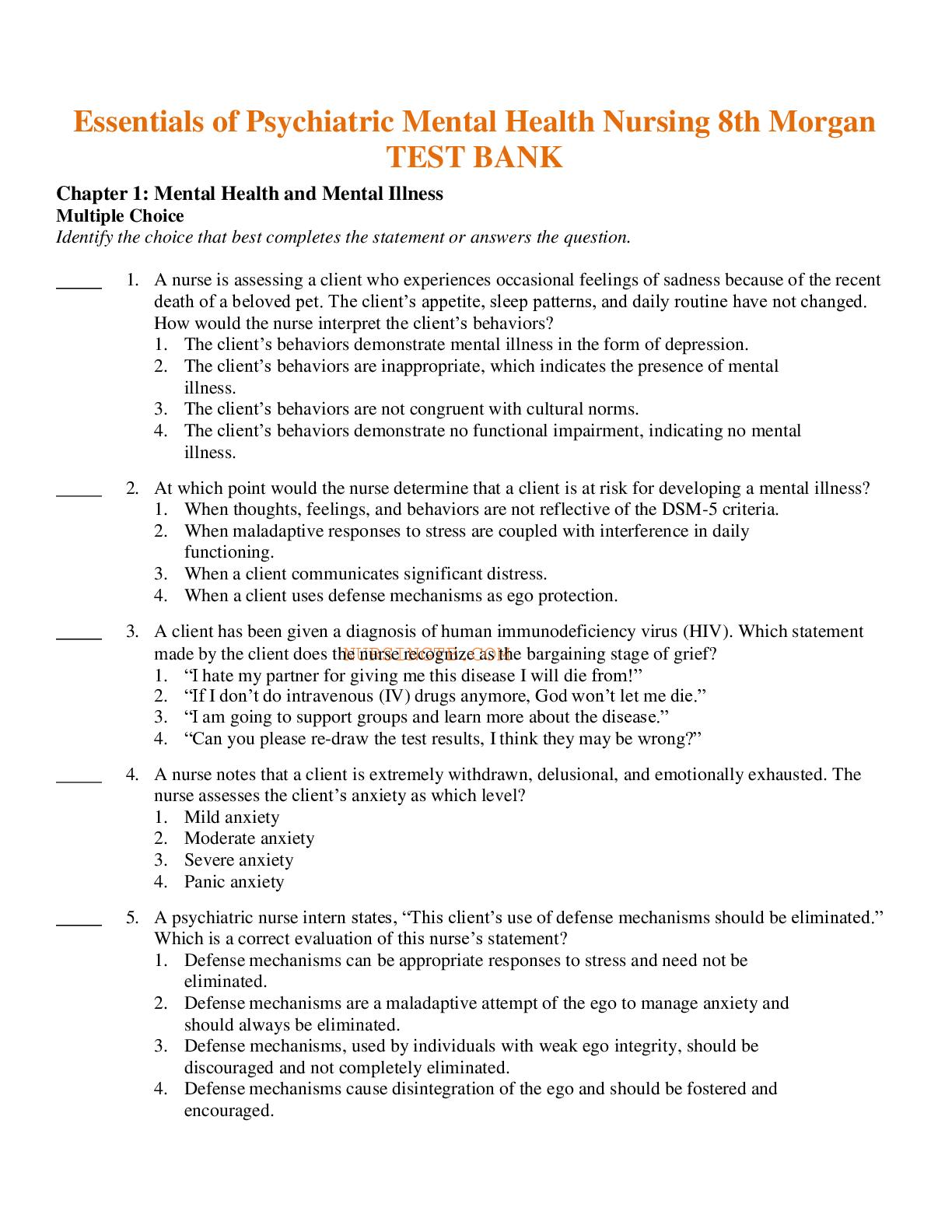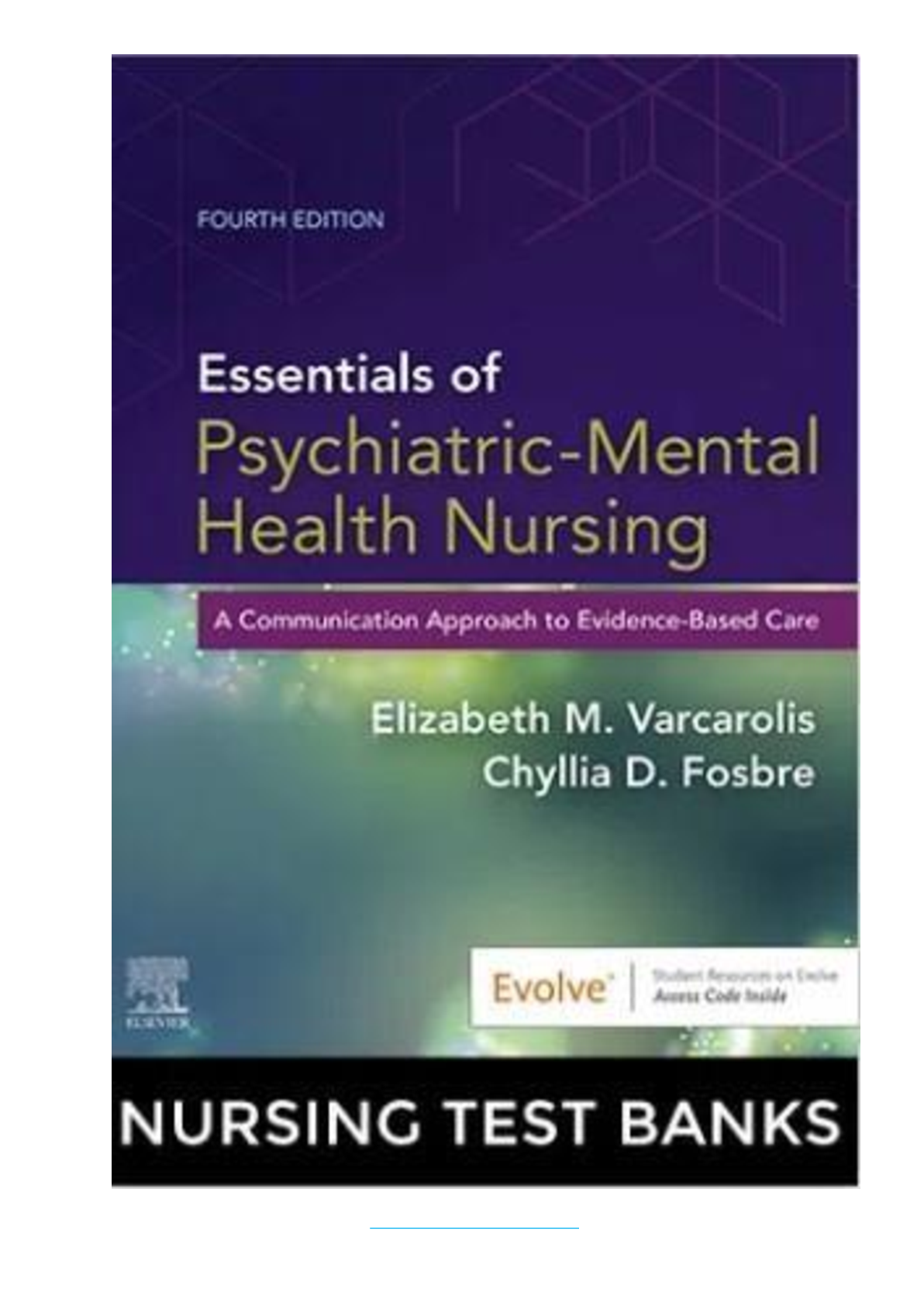*NURSING > TEST BANK > TEST BANK PSYCHIATRIC MENTAL HEALTH NURSING BY MARY TOWNSEND 9TH EDITION 2017 Test Bank with Complet (All)
TEST BANK PSYCHIATRIC MENTAL HEALTH NURSING BY MARY TOWNSEND 9TH EDITION 2017 Test Bank with Complete Questions and Solutions 307 PAGES
Document Content and Description Below
TEST BANK PSYCHIATRIC MENTAL HEALTH NURSING BY MARY TOWNSEND 9TH EDITION 2017. Test Bank with Complete Questions and Solutions 307 PAGES. To clarify, this is the test bank, not the textbook. You get i... mmediate access to download your test bank. You will receive a complete test bank; in other words, all chapters will be there. Test banks come in PDF format; therefore, you do not need specialized software to open them. PREVIEW.... Table of Contents Chapter 01. The Concept of Stress Adaptation Chapter 02. Mental Health/Mental Illness: Historical and Theoretical Concepts Chapter 03. Psychopharmacology Chapter 04. Concepts of Psychobiology Chapter 05. Ethical and Legal Issues in Psychiatric/Mental Health Nursing Chapter 06. Cultural and Spiritual Concepts Relevant to Psychiatric/Mental Health Nursing 1 2 9 20 28 37 47 Chapter 07. Relationship Development Chapter 08. Therapeutic Communication Chapter 09. The Nursing Process in Psychiatric/Mental Health Nursing Chapter 10. Therapeutic Groups Chapter 11. Intervention With Families Chapter 12. Milieu Therapy - The Therapeutic Community Chapter 13. Crisis Intervention Chapter 14. Assertiveness Training Chapter 15. Promoting Self-Esteem Chapter 16. Anger/Aggression Management Chapter 17. The Suicidal Client Chapter 18. Behavior Therapy Chapter 19. Cognitive Therapy Chapter 20. Electroconvulsive Therapy Chapter 21. The Recovery Model Chapter 22. Neurocognitive Disorders Chapter 23. Substance-Related and Addictive Disorders Chapter 24. Schizophrenia Spectrum and Other Psychotic Disorders Chapter 25. Depressive Disorders Chapter 26. Bipolar and Related Disorders Chapter 27. Anxiety, Obsessive-Compulsive, and Related Disorders Chapter 28: Trauma and Stressor-Related Disorders Chapter 29. Somatic Symptom and Dissociative Disorders Chapter 30. Issues Related to Human Sexuality and Gender Dysphoria Chapter 31. Eating Disorders Chapter 32. Personality Disorders Chapter 33. Children and Adolescents Chapter 34. The Aging Individual Chapter 35. Survivors of Abuse or Neglect Chapter 36. Community Mental Health Nursing Chapter 37. The Bereaved Individual Chapter 38. Military Families 54 62 74 85 93 99 104 109 117 123 130 139 146 155 162 169 175 186 197 208 219 230 238 244 249 257 269 279 284 290 297 302Test Bank - Psychiatric Mental Health Nursing by Mary Townsend (9th Edition, 2017) 2 Chapter 01. The Concept of Stress Adaptation Multiple Choice 1. A client has experienced the death of a close family member and at the same time becomes unemployed. This situation has resulted in a 6-month score of 110 on the Recent Life Changes Questionnaire. How should the nurse evaluate this client data? A. The client is experiencing severe distress and is at risk for physical and psychological illness. B. A score of 110 on the Miller and Rahe Recent Life Changes Questionnaire indicates no significant threat of stress-related illness. C. Susceptibility to stress-related physical or psychological illness cannot be estimated without knowledge of coping resources and available supports. D. The client may view these losses as challenges and perceive them as opportunities. ANS: C The Recent Life Changes Questionnaire is an expanded version of the Schedule of Recent Experiences and the Rahe-Holmes Social Readjustment Rating Scale. A 6-month score of 300 or more, or a year-score total of 500 or more, indicates high stress in a clients life. However, positive coping mechanisms and strong social support can limit susceptibility to stress-related illnesses. KEY: Cognitive Level: Application | Integrated Processes: Nursing Process: Evaluation | Client Need: Psychosocial Integrity 2. A physically and emotionally healthy client has just been fired. During a routine office visit he states to a nurse: Perhaps this was the best thing to happen. Maybe Ill look into pursuing an art degree. How should the nurse characterize the clients appraisal of the job loss stressor? A. Irrelevant B. Harm/loss C. Threatening D. Challenging ANS: D The client perceives the situation of job loss as a challenge and an opportunity for growth. KEY: Cognitive Level: Application | Integrated Processes: Nursing Process: Assessment | Client Need: Psychosocial Integrity 3. Which client statement should alert a nurse that a client may be responding maladaptively to stress? A. Ive found that avoiding contact with others helps me cope. B. I really enjoy journaling; its my private time. C. I signed up for a yoga class this week. D. I made an appointment to meet with a therapist. ANS: A Reliance on social isolation as a coping mechanism is a maladaptive method to relieve stress. It can prevent learning appropriate coping skills and can prevent access to needed support systems.Test Bank - Psychiatric Mental Health Nursing by Mary Townsend (9th Edition, 2017) 3 KEY: Cognitive Level: Application | Integrated Processes: Nursing Process: Evaluation | Client Need: Psychosocial Integrity 4. A nursing student finds that she comes down with a sinus infection toward the end of every semester. When this occurs, which stage of stress is the student most likely experiencing? A. Alarm reaction stage B. Stage of resistance C. Stage of exhaustion D. Fight-or-flight stage ANS: C At the stage of exhaustion, the students exposure to stress has been prolonged and adaptive energy has been depleted. Diseases of adaptation occur more frequently in this stage. KEY: Cognitive Level: Application | Integrated Processes: Nursing Process: Assessment | Client Need: Psychosocial Integrity 5. A school nurse is assessing a female high school student who is overly concerned about her appearance. The clients mother states, Thats not something to be stressed about! Which is the most appropriate nursing response? A. Teenagers! They dont know a thing about real stress. B. Stress occurs only when there is a loss. C. When you are in poor physical condition, you cant experience psychological well-being. D. Stress can be psychological. A threat to self-esteem may result in high stress levels. ANS: D Stress can be physical or psychological in nature. A perceived threat to self-esteem can be as stressful as a physiological change. KEY: Cognitive Level: Application | Integrated Processes: Nursing Process: Implementation | Client Need: Psychosocial Integrity 6. A bright student confides in the school nurse about conflicts related to attending college or working to add needed financial support to the family. Which coping strategy is most appropriate for the nurse to recommend to the student at this time? A. Meditation B. Problem-solving training C. Relaxation D. Journaling ANS: B The student must assess his or her situation and determine the best course of action. Problem-solving training, by providing structure and objectivity, can assist in decision making. KEY: Cognitive Level: Application | Integrated Processes: Nursing Process: Implementation | Client Need: Psychosocial IntegrityTest Bank - Psychiatric Mental Health Nursing by Mary Townsend (9th Edition, 2017) 4 7. An unemployed college graduate is experiencing severe anxiety over not finding a teaching position and has difficulty with independent problem-solving. During a routine physical examination, the graduate confides in the clinic nurse. Which is the most appropriate nursing intervention? A. Encourage the student to use the alternative coping mechanism of relaxation exercises. B. Complete the problem-solving process for the client. C. Work through the problem-solving process with the client. D. Encourage the client to keep a journal. ANS: C During times of high anxiety and stress, clients will need more assistance in problem-solving and decision making. KEY: Cognitive Level: Application | Integrated Processes: Nursing Process: Implementation | Client Need: Psychosocial Integrity 8. A school nurse is assessing a distraught female high school student who is overly concerned because her parents cant afford horseback riding lessons. How should the nurse interpret the students reaction to her perceived problem? A. The problem is endangering her well-being. B. The problem is personally relevant to her. C. The problem is based on immaturity. D. The problem is exceeding her capacity to cope. ANS: B Psychological stressors to self-esteem and self-image are related to how the individual perceives the situation or event. Self-image is of particular importance to adolescents, who feel entitled to have all the advantages that other adolescents experience. KEY: Cognitive Level: Application | Integrated Processes: Nursing Process: Evaluation | Client Need: Psychosocial Integrity 9. Meditation has been shown to be an effective stress management technique. When meditation is effective, what should a nurse expect to assess? A. An achieved state of relaxation B. An achieved insight into ones feelings C. A demonstration of appropriate role behaviors D. An enhanced ability to problem-solve ANS: A Meditation produces relaxation by creating a special state of consciousness through focused concentration. KEY: Cognitive Level: Application | Integrated Processes: Nursing Process: Evaluation | Client Need: Psychosocial Integrity 10. A distraught, single, first-time mother cries and asks a nurse, How can I go to work if I cant afford childcare? What is the nurses initial action in assisting the client with the problem-solving process?Test Bank - Psychiatric Mental Health Nursing by Mary Townsend (9th Edition, 2017) 5 A. Determine the risks and benefits for each alternative. B. Formulate goals for resolution of the problem. C. Evaluate the outcome of the implemented alternative. D. Assess the facts of the situation. ANS: D Before any other steps can be taken, accurate information about the situation must be gathered and assessed. KEY: Cognitive Level: Application | Integrated Processes: Nursing Process: Implementation | Client Need: Psychosocial Integrity 11. A nursing instructor is asking students about diseases of adaptation and when they are likely to occur. Which student response indicates that learning has occurred? A. When an individual has limited experience dealing with stress B. When an individual inherits maladaptive genes C. When an individual experiences existing conditions that exacerbate stress D. When an individuals physiological and psychological resources have become depleted ANS: D During the stage of exhaustion of the general adaptation syndrome, the individual loses the capacity to adapt effectively because physiological and psychological resources have become depleted. This is the time when diseases of adaptation may occur. KEY: Cognitive Level: Application | Integrated Processes: Nursing Process: Evaluation | Client Need: Health Promotion and Maintenance 12. When an individuals stress response is sustained over a long period of time, which physiological effect of the endocrine system should a nurse anticipate? A. Decreased resistance to disease B. Increased libido C. Decreased blood pressure D. Increased inflammatory response ANS: A In a general adaptation syndrome, prolonged exposure to stress leads to the stage of exhaustion at which time the bodys compensatory mechanisms no longer function effectively and diseases of adaptation occur. A decreased immune response is seen at this stage. KEY: Cognitive Level: Application | Integrated Processes: Nursing Process: Assessment | Client Need: Physiological Integrity 13. Which symptom should a nurse identify as typical of the fight-or-flight response? A. Pupil constriction B. Increased heart rateTest Bank - Psychiatric Mental Health Nursing by Mary Townsend (9th Edition, 2017) 6 C. Increased salivation D. Increased peristalsis ANS: B During the fight-or-flight response, the heart rate increases in response to the release of epinephrine. Pupils dilate to enhance vision. Salivation and peristalsis decrease as the body slows unessential functions. OK KEY: Cognitive Level: Comprehension | Integrated Processes: Nursing Process: Assessment | Client Need: Physiological Integrity 14. A nurse is evaluating a clients response to stress. What would indicate to the nurse that the client is experiencing a secondary appraisal of the stressful event? A. When the individual judges the event to be benign B. When the individual judges the event to be irrelevant C. When the individual judges the resources and skills needed to deal with the event D. When the individual judges the event to be pleasurable ANS: C When the individual judges the resources and skills needed to deal with the event, the individual is conducting a secondary appraisal. There are three types of primary appraisals: irrelevant, benign-positive, and stressful. KEY: Cognitive Level: Application | Integrated Processes: Nursing Process: Evaluation | Client Need: Psychosocial Integrity 15. Research undertaken by Miller and Rahe in 1997 demonstrated a correlation between the effects of life change and illness. This research led to the development of the Recent Life Changes Questionnaire (RLCQ). Which principle most limits the effectiveness of this tool? A. Specific illnesses are not identified. B. The numerical values associated with specific life events are randomly assigned C. Stress is viewed as only a physiological response. D. Personal perception of the event is excluded. ANS: D Individuals differ in response to life events. The RLCQ uses a scale that does not take these differences into consideration. KEY: Cognitive Level: Application | Integrated Processes: Nursing Process: Evaluation | Client Need: Health Promotion and Maintenance 16. A client who experiences stress on a regular basis asks a nurse what causes these feelings. Which is the most appropriate nursing response? A. Genetics have nothing to do with your temperament. B. How you reacted to past experiences influences how you feel now. C. If youre in good physical health, your stress level will be low. D. Stress can always be avoided if appropriate coping mechanisms are employed.Test Bank - Psychiatric Mental Health Nursing by Mary Townsend (9th Edition, 2017) 7 ANS: B Past experiences are occurrences that result in learned patterns that can influence an individuals current adaptation response. They include previous exposure to the stressor or other stressors in general, learned coping responses, and degree of adaptation to previous stressors. KEY: Cognitive Level: Application | Integrated Processes: Nursing Process: Implementation | Client Need: Psychosocial Integrity Multiple Response 17. A nurse is interviewing a distressed client, who relates being fired after 15 years of loyal employment. Which of the following questions would best assist the nurse to determine the clients appraisal of the situation? Select all that apply. A. What resources have you used previously in stressful situations? B. Have you ever experienced a similar stressful situation? C. Who do you think is to blame for this situation? D. Why do you think you were fired from your job? E. What skills do you possess that might lead to gainful employment? ANS: A, B, E These questions specifically address the clients coping resources and encourage the client to apply learning from past experiences. These questions also encourage the client to consider alternative methods for dealing with stress. Asking who is to blame does not assess coping abilities but, rather, encourages maladaptive behavior. Requesting an explanation is a nontherapeutic block to communication. KEY: Cognitive Level: Application | Integrated Processes: Nursing Process: Assessment | Client Need: Psychosocial Integrity 18. A nurse is working with a client who has recently been under a great deal of stress. Which nursing recommendations would be most helpful when assisting the client in coping with stress? Select all that apply. A. Enjoy a pet. B. Spend time with a loved one. C. Listen to music. D. Focus on the stressors. E. Journal your feelings. ANS: A, B, C, E Focusing on the stressors is more likely to increase stress in the clients life. However, pets, music, journaling feelings, and healthy relationships have all been shown to decrease amounts of stress. KEY: Cognitive Level: Application | Integrated Processes: Nursing Process: Implementation | Client Need: Psychosocial Integrity 19. A nurse is conducting education on anxiety and stress management. Which of the following should be identified as the most important initial step in learning how to manage anxiety? A. Diagnostic blood testsTest Bank - Psychiatric Mental Health Nursing by Mary Townsend (9th Edition, 2017) 8 B. Awareness of factors creating stress C. Relaxation exercises D. Identifying support systems ANS: B Although all of the above answers may be useful in the comprehensive management of stress, the initial step is awareness that stress is being experienced and awareness of factors that create stress. KEY: Cognitive Level: Analysis | Integrated Processes: Teaching/Learning | Client Need: Psychosocial Integrity 20. A patient presents in the Emergency Department immediately following a shooting incident in a school where she has been teaching. There is no evidence of physical injury, but she appears very hyperactive and talkative. Which of these symptoms manifested by the patient are common initial biological responses to stress? Select all that apply. A. Constricted pupils B. Watery eyes C. Unusual food cravings D. Increased heart rate E. Increased respirations ANS: B, D, E Increased lacrimal secretions, increased heart rate, and increased respirations are identified as initial biological responses to stress. Since dilated pupils rather than constricted pupils are related to Fight or Flight syndrome, this symptom should be assessed for other potential causes. Unusual food cravings have not been identified as a typical biological response to stress. KEY: Cognitive Level: Analysis | Integrated Processes: Nursing Process: Assessment | Client Need: Physiological IntegrityTest Bank - Psychiatric Mental Health Nursing by Mary Townsend (9th Edition, 2017) 9 Chapter 02. Mental Health/Mental Illness: Historical and Theoretical Concepts Multiple Choice 1. A nurse is assessing a client who is experiencing occasional feelings of sadness because of the recent death of a beloved pet. The clients appetite, sleep patterns, and daily routine have not changed. How should the nurse interpret the clients behaviors? A. The clients behaviors demonstrate mental illness in the form of depression. B. The clients behaviors are extensive, which indicates the presence of mental illness. C. The clients behaviors are not congruent with cultural norms. D. The clients behaviors demonstrate no functional impairment, indicating no mental illness. ANS: D The nurse should assess that the clients daily functioning is not impaired. The client who experiences feelings of sadness after the loss of a pet is responding within normal expectations. Without significant impairment, the clients distress does not indicate a mental illness. KEY: Cognitive Level: Analysis | Integrated Processes: Nursing Process: Assessment | Client Need: Psychosocial Integrity 2. At what point should the nurse determine that a client is at risk for developing a mental disorder? A. When thoughts, feelings, and behaviors are not reflective of the DSM-5 criteria B. When maladaptive responses to stress are coupled with interference in daily functioning C. When the client communicates significant distress D. When the client uses defense mechanisms as ego protection ANS: B The nurse should determine that the client is at risk for mental disorder when responses to stress are maladaptive and interfere with daily functioning. The DSM-5 indicates that in order to be diagnosed with a mental disorder, there must be significant disturbance in cognition, emotion, regulation, or behavior that reflects a dysfunction in the psychological, biological or developmental processes underlying mental functioning. These disorders are usually associated with significant distress or disability in social, occupational, or other important activities. The clients ability to communicate distress would be considered a positive attribute. KEY: Cognitive Level: Application | Integrated Processes: Nursing Process: Assessment | Client Need: Psychosocial Integrity 3. A nurse is assessing 15-year-old identical twins who respond very differently to stress. One twin becomes anxious and irritable, while the other withdraws and cries. How should the nurse explain these different responses to stress to the parents? A. Reactions to stress are relative rather than absolute; individual responses to stress vary. B. It is abnormal for identical twins to react differently to similar stressors. C. Identical twins should share the same temperament and respond similarly to stress. D. Environmental influences weigh more heavily than genetic influences on reactions to stress. [Show More]
Last updated: 11 months ago
Preview 1 out of 307 pages
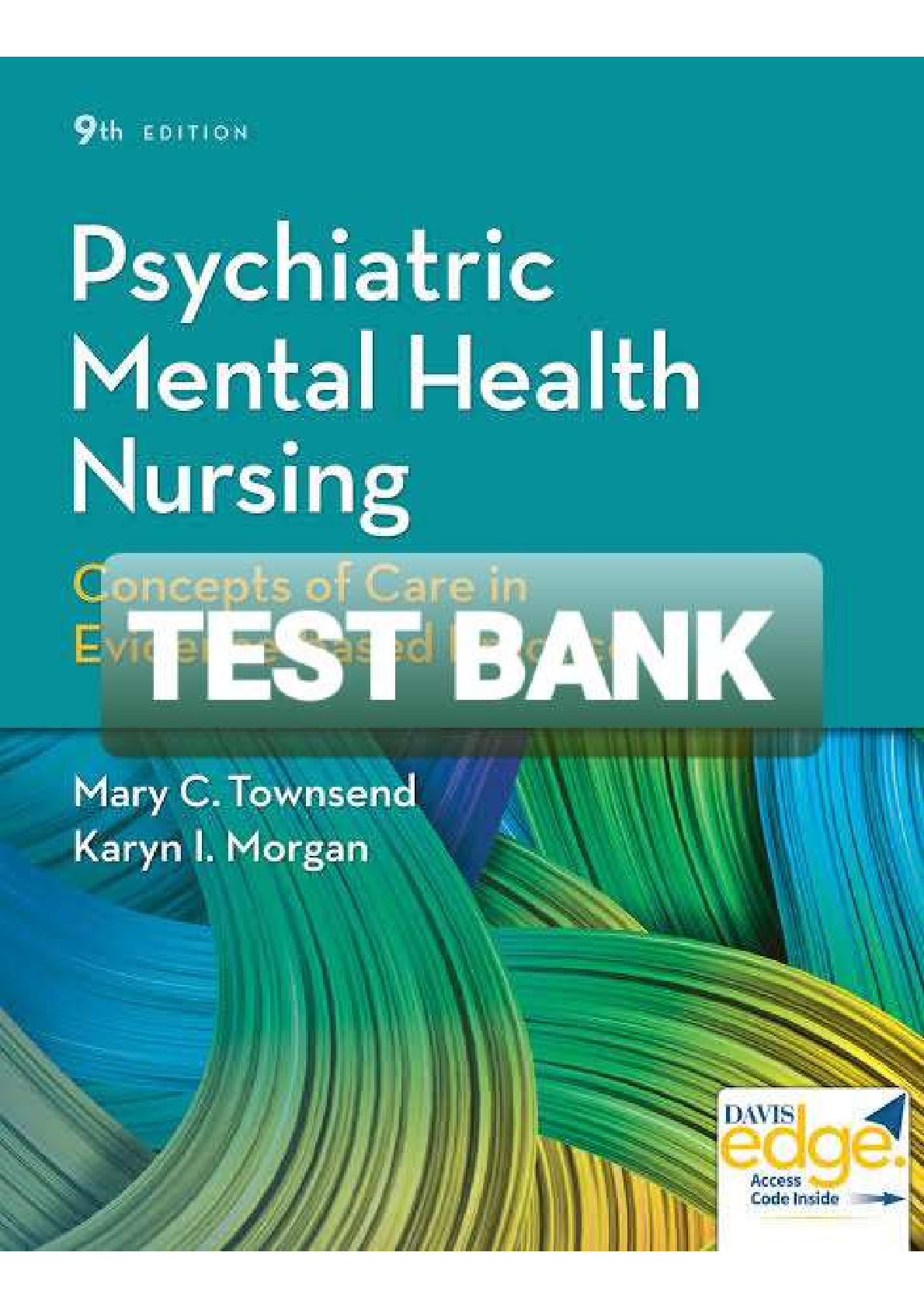
Reviews( 0 )
Document information
Connected school, study & course
About the document
Uploaded On
Oct 11, 2021
Number of pages
307
Written in
Additional information
This document has been written for:
Uploaded
Oct 11, 2021
Downloads
0
Views
43

